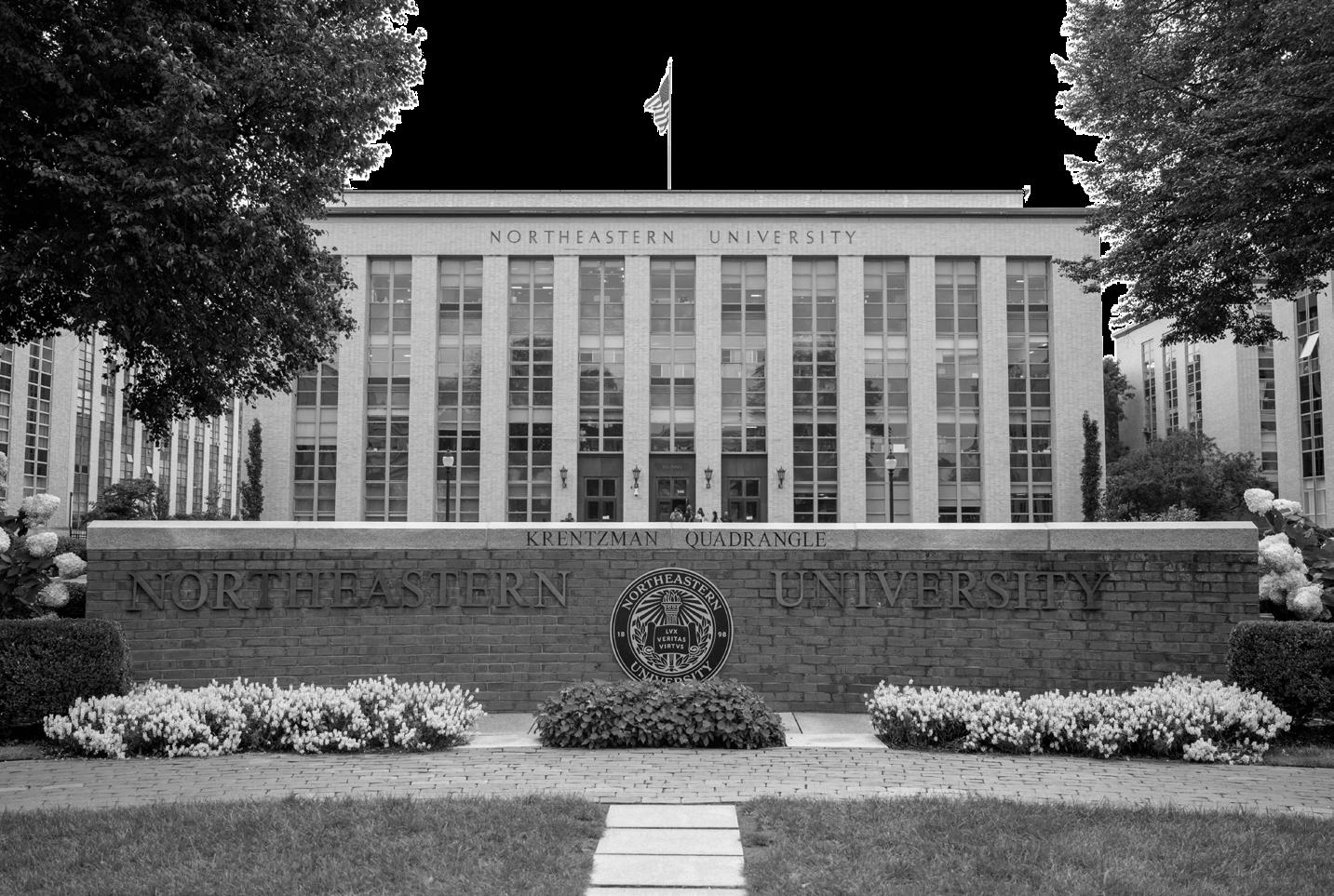
April 11, 2025
The independent student newspaper of the Northeastern community | Est. 1926


April 11, 2025
The independent student newspaper of the Northeastern community | Est. 1926
With its 5.2% acceptance rate, getting into North eastern is no small feat.
But once students arrive, some say the intellectual challenge stops. Class rooms, which are meant to be spaces for debate and discussion, turn into echo chambers for many students.
Hope Broadhurst, a third-year journalism and history combined major, said this environment hinders discussions in class.

elections. Many students say the lack of political diversity often makes in-class conversations feel like roundabout discussions rather than animated


“I thought everyone in the class was so smart, but we never, ever disagreed,” Broadhurst said. “It was the exact same language; it’s the same lexicon. We all used the same set of words.”
Northeastern is currently ranked as the 16th-most liberal college in America, according to Niche. This left-leaning climate was reflected in a poll conducted by The Huntington News last fall, which found that 85.6% of Northeastern students planned to add in polled to vote for Kamala Harris in the 2024 presedential
off of that,’ ‘And in agreement with that.’ Just a crazy chain of repeat, repeat, repeat,” said Cambel Shim, a first-year political science and communication studies combined major.
For Broadhurst, the lack of debate in the classroom raises the question of whether Northeastern students are prepared to take part in more confrontational political discourse outside of a uni versity setting.
it doesn’t allow them to actually have the skills to defend their beliefs.”

“I think it gives the illusion that your beliefs are unani mous,” Broadhurst said. “The biggest det riment to people is that

Shim recounted one instance in which a classmate offered an opposing viewpoint during an in-class discussion and the impact it had on them and their peers.
“Somebody, a man, had just been like, ‘I don’t agree,’ and everyone stopped in their tracks because we were all kind of agreeing with each
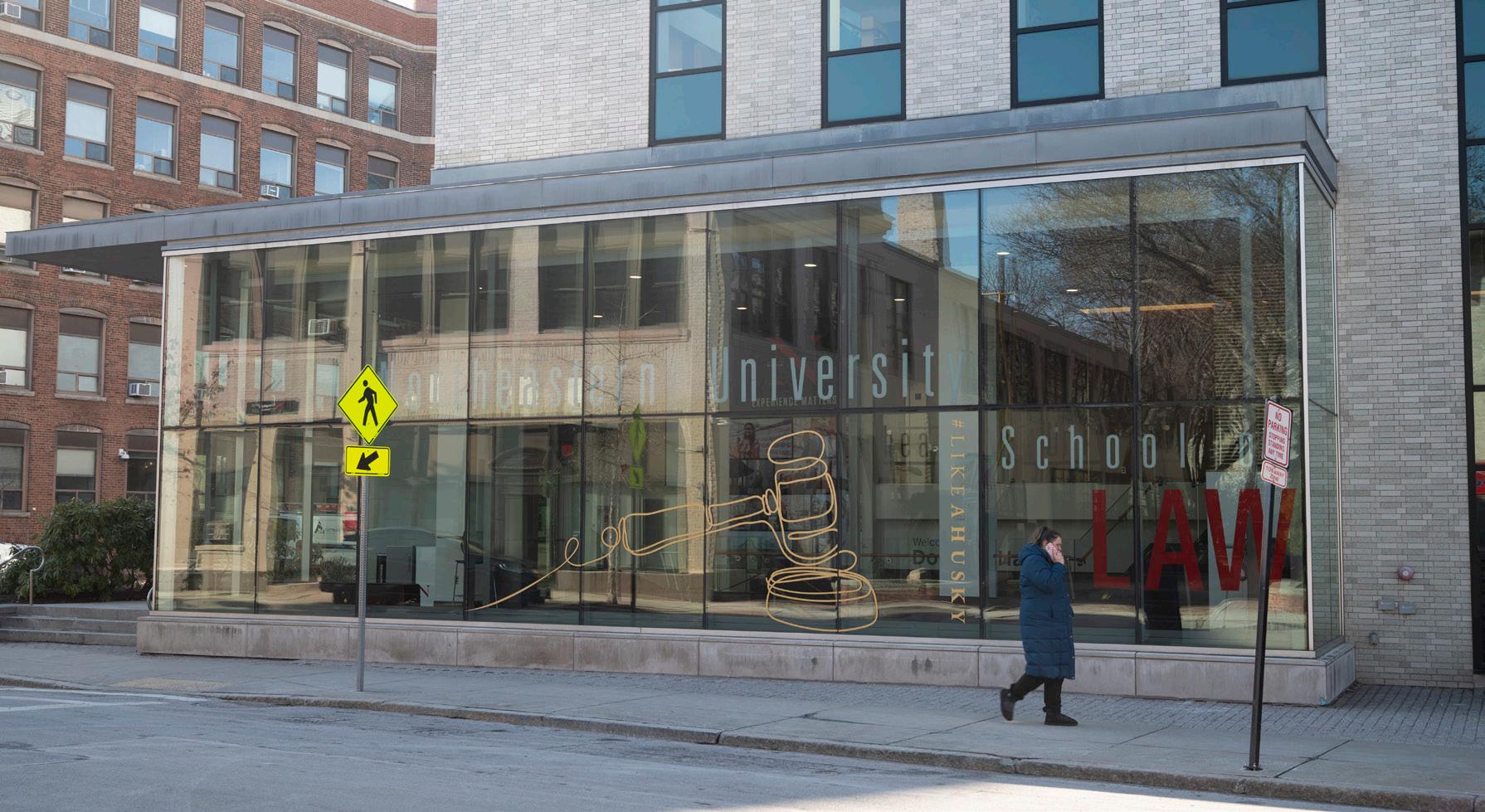
CHRIS LEE News Correspondent
Northeastern University School of Law’s total enrolled Black students has sat around 7% of its entire student body since the school began collecting data in 2011. This year, the amount of law students who identi-
fied as Black reached an all-time low of 4.8% of the student body, which grew to 729 in 2024.
The number of first-year Northeastern School of Law, or NUSL, students identifying as Black dropped to eight — or just 3% of the class — in 2024, the lowest since 2015, when there were seven. The drop comes
other and bouncing off of each other, and then we’re immediately hit with that disagreement — it’s difficult,” Shim said.

Northeastern also finds itself at the center of one of the nation’s liberal strongholds. Massachusetts is consistently ranked as one of the most Democratic states in the nation, with 61% of voters voting blue in the 2024 presidential election, according to NBC.

“Being in these liberal bubbles has honestly made me more critical of the Democratic Party in the U.S.,” said Neil Olsson, a first-year international affairs and economics combined major from Washington, D.C., where 92.46% of voters cast their ballot for Kamala Harris in the 2024 election.
Inside Northeastern’s Sidechat community
Read about how students bond on the platform.

Graphic by Catherine Gore
Bostonians rally against Trump administration
Read about the April 5 “hands off” Boston rally.
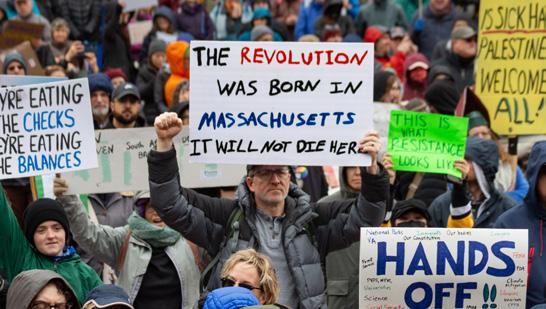
Solve The News’ April crossword!
Check your answers from the last print.

one admissions cycle after the United States Supreme Court’s landmark affirmative action ruling, which effectively prohibits universities from considering race as a factor in admissions. After the ruling, Black undergraduate student enrollment dropped by 35% for the Class of 2028.”
For nearly 100 years, The Huntington News has delivered vigorous, relevant and high-quality student journalism to Northeastern students, faculty, alumni, families and community members.
A critical part of that journalism, operating independently of the university since 2008, is our opinion section. The section offers a space for members of the Northeastern community to voice their perspectives on university, local and national issues. We are proud to have an opinion section where any Northeastern community member can freely express their point of view on news relevant to the campus community.
In the past, contributors have written about Northeastern’s student government and the university’s administration, how to behave at concerts and the use of artificial intelligence in classrooms. If you’re interested in contributing your opinion to The News, please contact comments@huntnewsnu.com.
We will continue to provide a platform for our fellow students, faculty and community members to write pieces about anything they find important.
But today, we face an inflection point.
Higher education institutions across the country are facing threats of investigation, with hundreds of millions of dollars in federal funding at risk. Students are being picked off the streets and put into unmarked vans. As students and practitioners of journalism, threats against independent reporting inhibit our — and all journalists’ — ability to seek truth and hold power to account.
All the while, leaders of universities around the country like Northeastern have remained silent. The News will not.
While we will continue to provide essential, objective reporting to our readers, we now find it necessary to strengthen and unite the voice of The News’ editorial wing.
This month, The News is published its first piece from its new Editorial Board.
Students say like-minded opinions at NU undermine class discourse: ‘It was the exact same language’
Neil Olsson said political bubbles create passiveness in the Democratic Party, something he attributes as being a key issue in the 2024 presidential election. Many Northeastern students were stunned by President Donald Trump’s win, a result that appeared to contrast expectations on campus.


“With the Democrats, they just presume that people will hate Trump, which is just a really dumb way of doing it, and it lost them an election,” Olsson said.
Hope Broadhurst said existing in these political bubbles can cause some students to freeze up in in

“They don’t have the skills to go out into the real world where someone actu ally has a really good rebuttal to
their argument,” Broadhurst said. “I think people are absolutely floored; they have no resilience to pose an immediate
a larger problem down the line for students

“We have the privilege of being negligent because we live in Massachusetts,” Shim said. “But you may not always live in Massa chusetts, and you may not always

the question students are left with is what they can do to ensure they are engaging in mean-

your professor. I find professors are most ready and willing to play devil’s advocate in the moment.”
Another way that some students have sought out political discussion is through debates conducted by the Northeastern University Democrats and College Re publicans,

Between 2022-23 and 202324, the number of Black students enrolled in NUSL decreased from 11 to eight, according to data from the American Bar Association, or ABA.
“Like all colleges and universities in the U.S., Northeastern was required to change its admissions protocols to comply with the Supreme Court’s 2023 ruling,” Renata Nyul, Northeastern’s vice president for communications, wrote in an email to The Huntington News. “We continue to place tremendous value on the educational benefits of a diverse student body, and seek to enroll students from a broad range of life experiences within the bounds of the law.”
In total, there were 165 students in NUSL’s 2024 first-year class, according to the data, which the ABA started requiring accredited law schools to report in 2011. NUSL officially reported that 18.9% of first-year students identify as a person of color, while 47.5% of students identified as white and 33.6% of students were labeled as “Race and Ethnicity Unknown.”
Since 2021, when 22 students who identified as Black made up 9.2% of the first-year class, NUSL’s reported enrollment of Black students has continued to steadily decline.
This year marks the first time since 2019 that first-year enrollment has dropped to less than 10 students; in 2019, it enrolled nine.
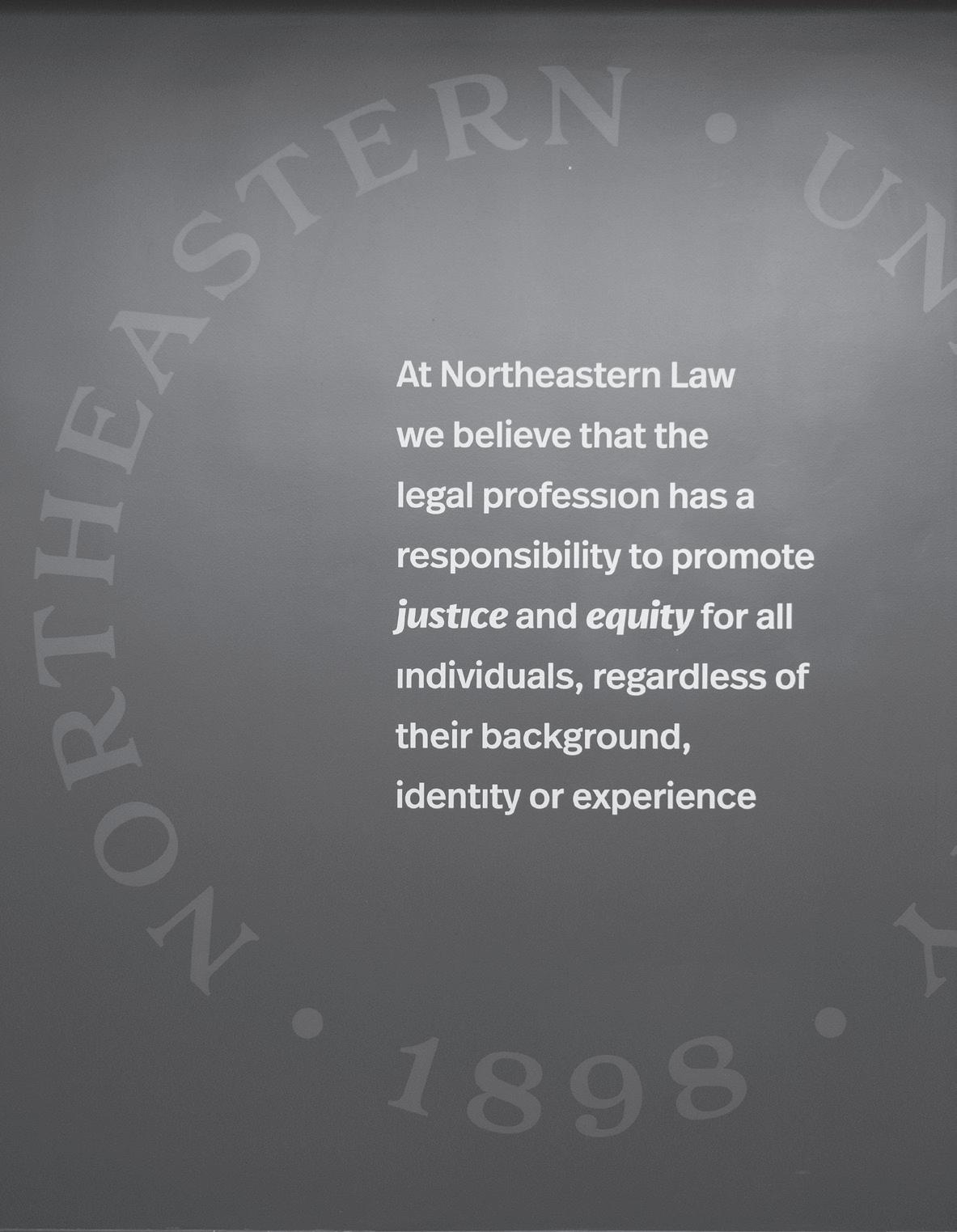
The 4.8% statistic at Northeastern is lower than several nearby law schools; in 2024, Black students constituted 5.4% and 9% of the total law school student enrollment at Boston University and Boston College, respectively. This year, Harvard Law School’s Black student enrollment decreased by half, sitting at 3.4%.
Despite the decline in Black student enrollment, the total student population of NUSL has continued to increase. This year, NUSL enrolled a total of 729 students, an increase of 166 since 2017. Total application numbers have also risen; NUSL received 4,133 total applications this year, a 40% increase compared to the 2016 application cycle.

Kiana Pierre-Louis, the associate dean for equity, belonging and student affairs at NUSL, did not respond to requests for comment from The News.
Aliza Hochman Bloom, an assistant professor of law at NUSL who specializes in criminal law and procedure and the Fourth Amendment, said a diverse legal field is important for preparing the next generation of lawyers. Last year, the ABA reported that just 5% of lawyers in the U.S. identify as Black.
“I think the classroom and the breadth of life experiences, which includes racial experience, class experience and perspective geographic experience matters a lot when you’re learning law,” Hochman Bloom said.
Such diversity in a classroom plays a large role in the learning experiences of Hochman Bloom’s students when discussing how race and law are intertwined, she said.
From the early roots of racism in criminal law to the current state of law enforcement, these issues are consistently discussed in her class.
“I think in our current climate, it is more important than ever that we are training people to become lawyers who are able to operate within a system,” Hochman Bloom said. “And I really strongly believe that you need to know the tools of the system in order to change it in order to inform it, in order to reimagine it.”
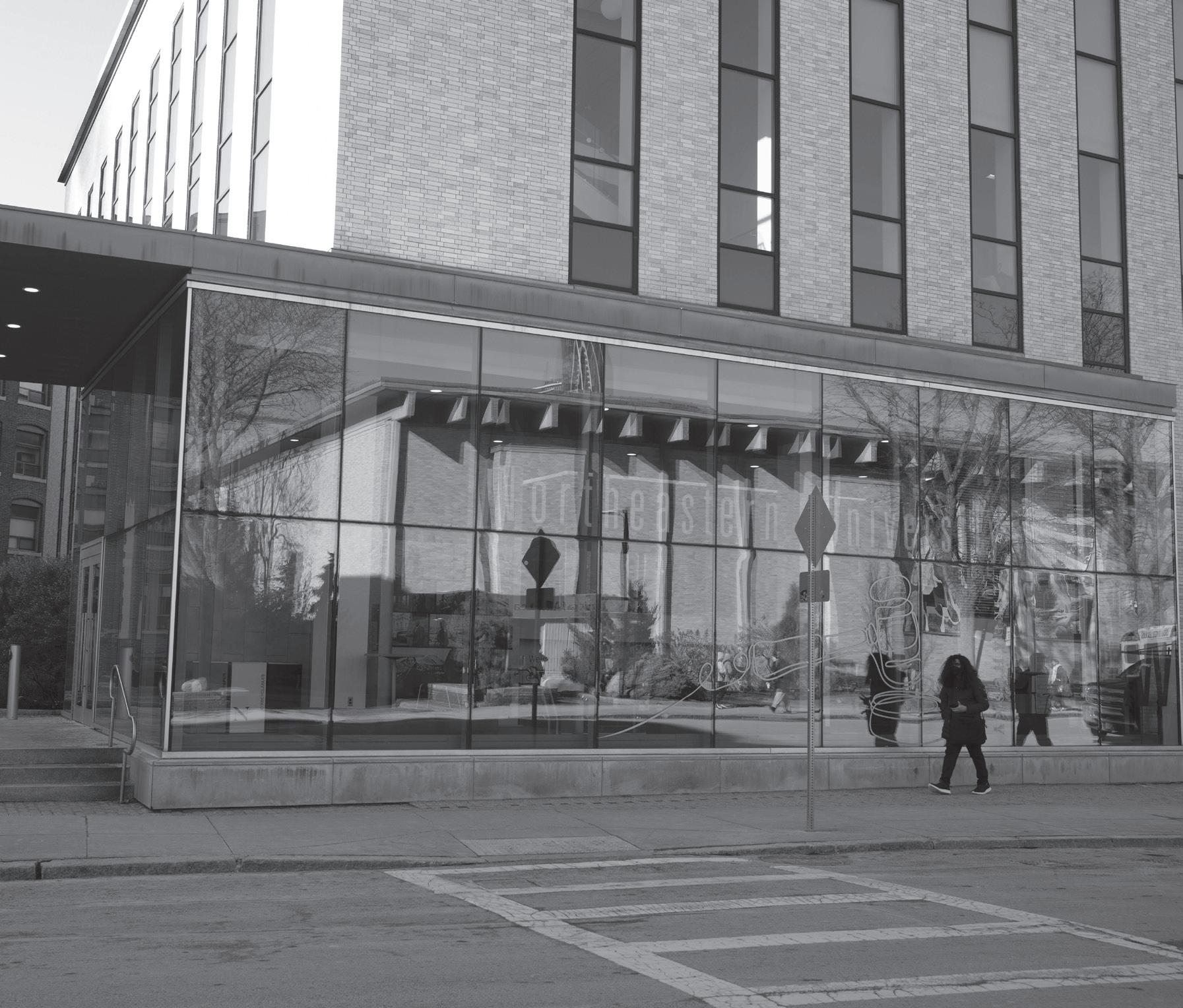
Campus Editor, News Staff, News Correspondent
Since President Donald Trump took office Jan. 20, he has made his outlook on non-citizens clear.
“This is the first arrest of many to come,” Trump wrote in a March 10 Truth Social post about Columbia University graduate Mahmoud Khalil’s arrest. “We know there are more students at Columbia and other universities across the Country who have engaged in pro-terrorist, anti-Semitic, anti-American activity, and the Trump Administration will not tolerate it. Many are not students, they are paid agitators. We will find, apprehend, and deport these terrorist sympathizers from our country — never to return again.”
Northeastern confirmed in an email to The Huntington News April 7 that approximately 40 individuals affiliated with Northeastern — 18 students and 22 recent graduates — have had visas revoked across its 10 U.S. campuses. The federal government is scouring college campuses nationwide for international students “who have allegedly engaged in
criminal behavior while in the U.S.,” according to the university’s “Navigating a New Political Landscape” FAQ page, which has served as the university’s central means for communication to the community since Trump took office.
As of April 9, CNN reported that more than 340 students, faculty and researchers have had their visas revoked at universities across the country. Now, international community members are bracing for impact.
A second-year master’s student from India, who was granted anonymity by The News due to fear of retaliation from the federal government, has a job lined up for August. They are uncertain whether they will be able to carry out the role now that visas seem to be “dependent on fate.”
“I’m not a citizen of this country. I’m just somebody who is here — let’s be honest — as a guest in this country,” the student said.
“So I have to respect whoever comes in power, and I do that. It is your country. You guys will deal with it,” he said. “I will not interfere in whatever your internal politics is. But the thing is that we have to look after ourselves in the end because nobody else is going to do that for us.”
Northeastern F-1 and J-1 visa holders received an email from the Office of Global Services, or OGS, April 6 warning students of the mounting threats of visa revocations. The email advised students to carry proof of identity like a government-issued photo ID, their relevant F-1 or J-1 immigration papers and to monitor the university’s FAQ page for updates.
Now, students are retaining lawyers. Paul Toland, owner and founder of Toland Law, said the State Department can revoke a visa for “any reason whatsoever.”
The FAQ page states that there is “no evidence” the visa revocations of the individuals affiliated with Northeastern are a result of political advocacy or speech. Most recently, ICE activities have extended beyond detentions and into the digital space. The U.S. Citizenship and Immigration Services announced April 9 that the Department of Homeland Security will scour non-citizens’ social media accounts for any association to “antisemitism,” and many students are concerned of how broadly ICE defines the topic.
Giselle Rodriguez, a Boston-based immigration attorney, wrote in an email to The News that
social media posts are now a source of heightened concern.
“Social media posts, in particular, have become an issue more than ever before, and students should be cautious about what they share,” Rodriguez wrote in the statement. “Discretion is a big thing in immigration, and even a post without any ill intention, can be taken out of context.”
Some students are also concerned by the lack of communication beyond what is in the FAQ. Lina Petronino, a fifth-year journalism and psychology combined major and co-founder and communications director of the Northeastern democratic socialist publication Burning Rose, said the lack of information provided by the school was troubling.
“Northeastern prides itself on being an international university,” Petronino said. “Now more than ever, we need to be standing by the students because they are what makes Northeastern, Northeastern. … But the way that their actions are speaking right now is not aligning with [the goals of] an international university. I don’t see any form of solidarity or protection from administration.”
Deputy campus editor Aiden Stein contributed reporting.
Sixteen years ago, March 31, Rachel Crandall Crocker, executive director of the nonprofit Transgender Michigan, organized the first Transgender Day of Visibility. This week, for the first time, the City of Boston officially recognized the holiday. In a March 19 meeting, Boston City Councilor for District 8 Sharon Durkan and Boston City Councilor At-Large Henry Santana filed a resolution to codify Transgender Day of Visibility and hosted a reception and presentation to promote its citywide recognition. In honoring the holiday, the Boston City Council underscored the bravery and resilience of the transgender community despite the prejudice, violence and systemic barriers they face.
“Transgender Day of Visibility is about more than just recognition. It’s about honoring the courage of those who have often had to fight for their right to live authentically,” the council wrote in a press release March 21.
City Council highlighted local activists and organizations like Trans Resistance, a nonprofit that advocates for the rights of transgender people, and Fenway Health, a community health center that has served the LGBTQ+ community since 1971.

City Council also acknowledged the efforts of the Massachusetts Transgender Political Coalition, or MTPC, and Namesake, a dual collaborative with MTPC that works to make name changes more accessible for members of the LGBTQ+ community.
Boston City Hall called attention to not only the struggles of the transgender community, but also its profound contributions to society, whether that be through service, business leadership, social justice work or the arts.
Santana expressed his support for Transgender Day of Visibility’s observation via Instagram.
“More than just a date on the calendar, this day is a powerful affirmation of truth: Trans people exist. Trans people are real. Trans people are human,” Santana wrote on Instagram.
“Boston must be a safe haven. A place where our trans community not only survives, but thrives. A place of trans joy, where we are unwavering allies to our trans, genderqueer and non-binary siblings, within and beyond the LGBTQ+ community.”
On a national scale, in light of the Trump administration’s hostility toward the LGBTQ+ community, Crocker emphasized the importance of uplifting transgender people now more than ever.
“What [President Donald Trump] wants is to scare us into being invis-

ible again,” Crocker told PBS. “We have to show him we won’t go back.”
Professor K.J. Rawson is the director of the Humanities Center at Northeastern, as well as the founder and director of the Digital Transgender Archive, an award-winning collection of transgender-related historical materials. He also chairs the editorial board of the Homosaurus, a data vocabulary of LGBTQ-linked terms.
Amid the turbulence of the current political climate, in an emailed statement to The Huntington News, Rawson commended Boston’s official recognition of Transgender Day of Visibility.
“In this moment when transgender people are under unprecedented attack, Boston’s recognition of Transgender Day of Visibility is a welcome celebration of trans communities,” Rawson wrote. “Municipalities need to be forthcoming and overt in their recognition of trans people, not just in honoring Transgender Day of Visibility, but in becoming sanctuaries that advance protective legislation and offer sanctuary to those who are fleeing more hostile environments.”
While applauding the city’s resolution, Rawson’s statement emphasized that progress does not begin and end with visibility.
“To make Boston a safe haven for trans people, the city needs to not

‘Rooted’ art installation to be removed
The “Rooted” art installation on Krentzman Quad will be removed mid-April, the Student Government Association announced in an email to undergraduate students April 3.
The announcement comes after the Student Government Association, or SGA, voted to remove the art in October 2024 and follows extensive advocacy work from the student body and SGA. “Rooted” was installed in April 2024 as part of Northeastern’s Public Art Initiative and has been extensively compared to the Truffula Trees from Dr. Seuss’ “The Lorax.”
In a project summary, SGA wrote that “in response to widespread student frustration,” it advocated for the removal of the art installation.
A survey of 318 Northeastern students conducted by SGA’s Campus Planning Advisory Board found that 68% of students surveyed disliked the art piece, regardless of where it was located on campus. In April 2024, the same month the exhibit was installed, students circulated a petition that called for the removal of the art installation, which has since gained more than 1,900 signatures.
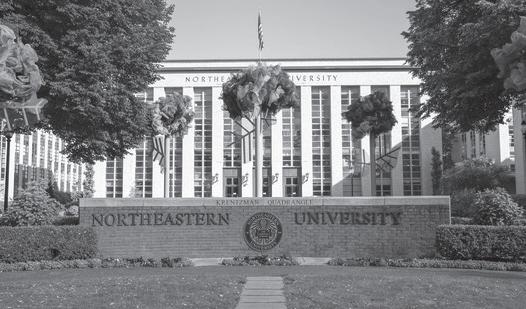
only focus on legislative efforts, but also on meeting the increasing and urgent everyday needs of trans people in terms of housing, employment, healthcare, legal representation, etc.,” Rawson wrote.
For allies looking to take meaningful next steps, “I highly encourage people to get involved — by donating their time and/or resources — in mutual aid efforts that directly reach trans people and organizations that are working directly with trans communities to advocate for our rights,” Rawson wrote in his statement.
As Boston moves forward, the recognition of Transgender Day of Visibility serves as both a celebration and a call to action — one that its supporters say demands continued advocacy, allyship and tangible change.


Boston student visas revoked under Trump Colleges and universities in and around Boston have reported international students having their visas revoked as the Trump administration threatens students who participated in political speech. More recently, visas have been revoked for a growing number of arbitrary or unknown reasons, including traffic infractions.
As of April 10, more than 300 student visas have been revoked, with 81 belonging to current and former students from schools in the Boston-area, including Northeastern, Emerson, University of Massachusetts Boston and Harvard.
In an email sent to Harvard international students and posted to the Harvard International Office, or HIO, website April 6, the HIO stated that three current Harvard students and two alumni have had their visas revoked.
“The University learned of the revocations during a routine records review. The HIO notified the students of the revocations and referred them to legal assistance,” HIO said in the statement.
Protests have sprung up around cities and college campuses following the administration’s crackdown on immigration policies. On March 26, Rümeysa Öztürk, a Turkish doctoral student at Tufts University, was arrested by non-uniformed U.S. Immigration and Customs Enforcement, or ICE, agents in Somerville, leading to an uptick in anti-ICE protests.
Over 50,000 people gathered in Boston Common April 5 for a “Hands Off Massachusetts” rally and march protesting the policies of President Donald Trump, tech billionaire Elon Musk and their political allies, according to 50501 Press Representative Rebecca Winter.
The Boston demonstration was one of at least 1,300 “Hands Off” rallies across all 50 states, as well as some held outside of the United States in London, Berlin and Paris. One hundred and eighteen organ-
the “Hands Off” rally focused on defending the rights of minorities and other communities in Boston targeted by Trump, including immigrants, LGBTQ+ individuals, universities and more.
“We want the administration to take their hands off of Boston, off of Massachusetts, off of America,” Winter said. “We want the power back to the people.”
Protesters met at Parkman Bandstand in Boston Common at 11 a.m. for speeches by the Rev. Mariama White-Hammond, who also served as the master of ceremonies for the event, Massachusetts American Federation of Labor and Congress of

izations co-sponsored the event, and Massachusetts 50501, which has organized several anti-Trump protests since Feb. 5, was one of the lead organizers.
“I cannot believe the amount of growth. The first 50501 protest I went to only had about 300 people,” Winter said.
“People are passionate about the destruction that’s happening to our
Industrial Organizations President Chrissy Lynch and Lt. Gov. Kim Driscoll. After her speech, Driscoll spoke with The Huntington News about the role of Massachusetts in sending a message to the rest of the country.
“Massachusetts is a leader,” Driscoll said.
“We stand up for values here that really matter and we know that we’re
to be the backstop and the beacon and protect ourselves from what’s happening in Washington.”
Driscoll also spoke about the importance of university students participating in protests.
“Stand with us. The future that we’re trying to build is going to be yours to lead and we need you to be part of this effort right now more than ever,” Driscoll said.
At 11:20 a.m., protesters flooded Tremont Street and marched to City Hall Plaza, where organizers had set up a stage for more speeches and musical performances. Notable speakers included Boston Mayor Michelle Wu, Massachusetts Sen. Edward Markey and Rep. Ayanna Pressley, among others.
“Trump’s Congress wanted to make an example of Boston. It might have been my voice that was in the microphone that day, but it was all of Boston that gave Congress their answer,” Wu said in her speech. “Hands off Boston.”
The protest also featured musical performances by Dropkick Murphys and the Boston Voices of Community and Labor choir. The members of Dropkick Murphys, who have a history of opposing Trump and his policies, debuted their new song “Who’ll Stand With Us” to start their brief acoustic set. Ken Casey, lead vocalist of Dropkick Murphys, spoke to The News about the importance of taking a political stand.
“[Trump] is trying to stifle any dissent and he’s trying to consolidate power, so we can’t give in, we can’t let him accomplish that goal,” Casey said.
Casey went on to say that while protests like the one in Boston are important, action by legislators is necessary to make substantial change.
“The people that are in Congress and the Senate should be chaining
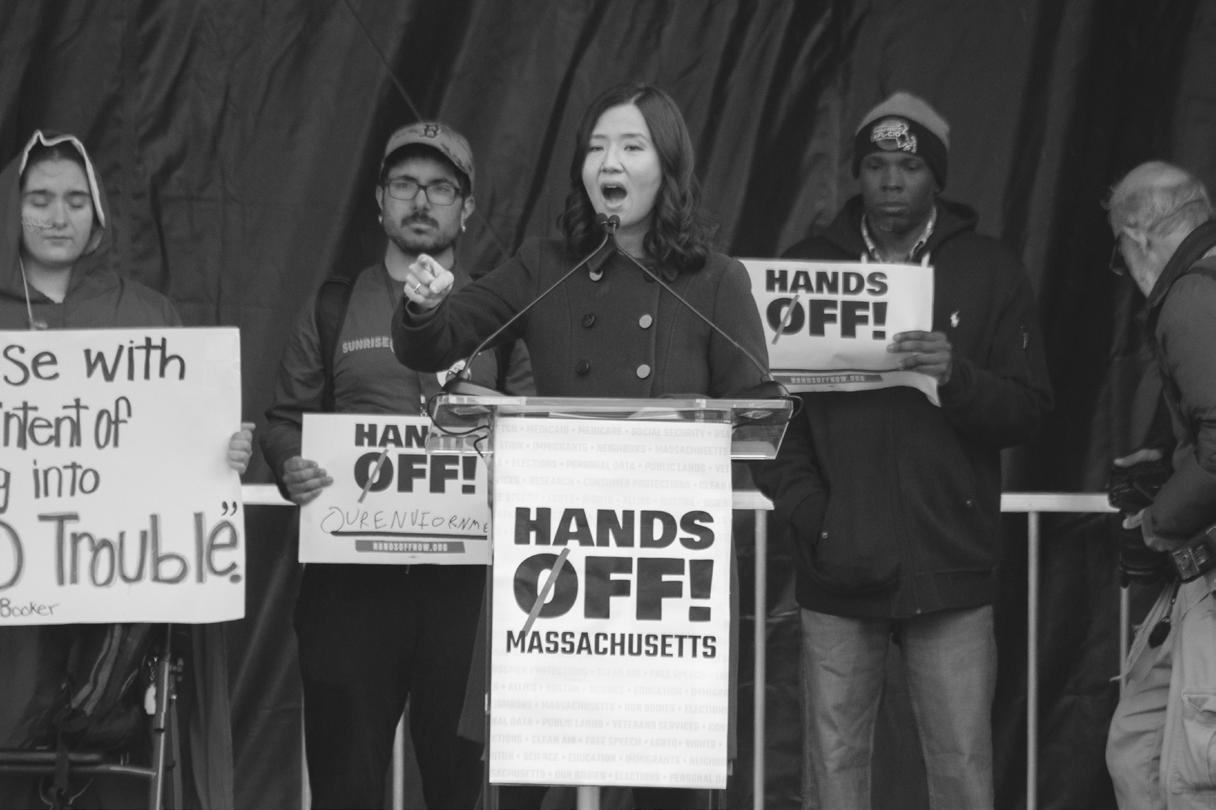
Michelle Wu points at the audience while speaking from a stage in City Hall Plaza. Wu’s speech revolved around Trump administration policies that have targeted Boston, such as border czar Tom Homan’s viral claim that “I’m coming to Boston, I’m bringing hell with me,” in reference to ICE raids and detentions. “They’re focused on Boston because we stand for everything they seek to tear down,” Wu said in her speech.
themselves to the doors and getting hauled off in cuffs if they have to, because that’s the level of protest we need right now,” Casey said.
Many attendees of the event showed off their creativity; protesters played instruments, wore imaginative costumes and carried homemade signs and props. The countless signs were decorated with slogans ranging from witty to profound, such as “Only the people can save the people,” “American democracy can’t be bought” and “I’ve seen better cabinets at IKEA.”
Mass protests of the past depended on art to captivate and empower the nation; April 5 was no different. Hundreds of protesters wore the feminist pussyhats.
“I think [music and art] bring people together. It gives people the opportunity to converse, it gives people the opportunity to support one another and it gives a feeling of
you’re suppressing human function and human expression.”
Trump has taken actions against artistic liberation, such as signing an executive order targeting the Smithsonian Institution and reallocating funds for the National Endowment for the Humanities, one of the United States’ primary conduits for federal arts and humanities funding. For Gomez Ickes and others at the rally, making and displaying art was an act of resistance in itself.
“I’m an art educator and an artist, and I’m a supporter of the arts, and I know that once the arts go down, that leads to suppression of other rights and other ways of dissenting, and all you need to do is look into the Nazi past and see how the arts were suppressed,” Gomez Ickes said. Similar rallies are planned for the coming months, though specific dates and details are yet to be confirmed, according to organizers.
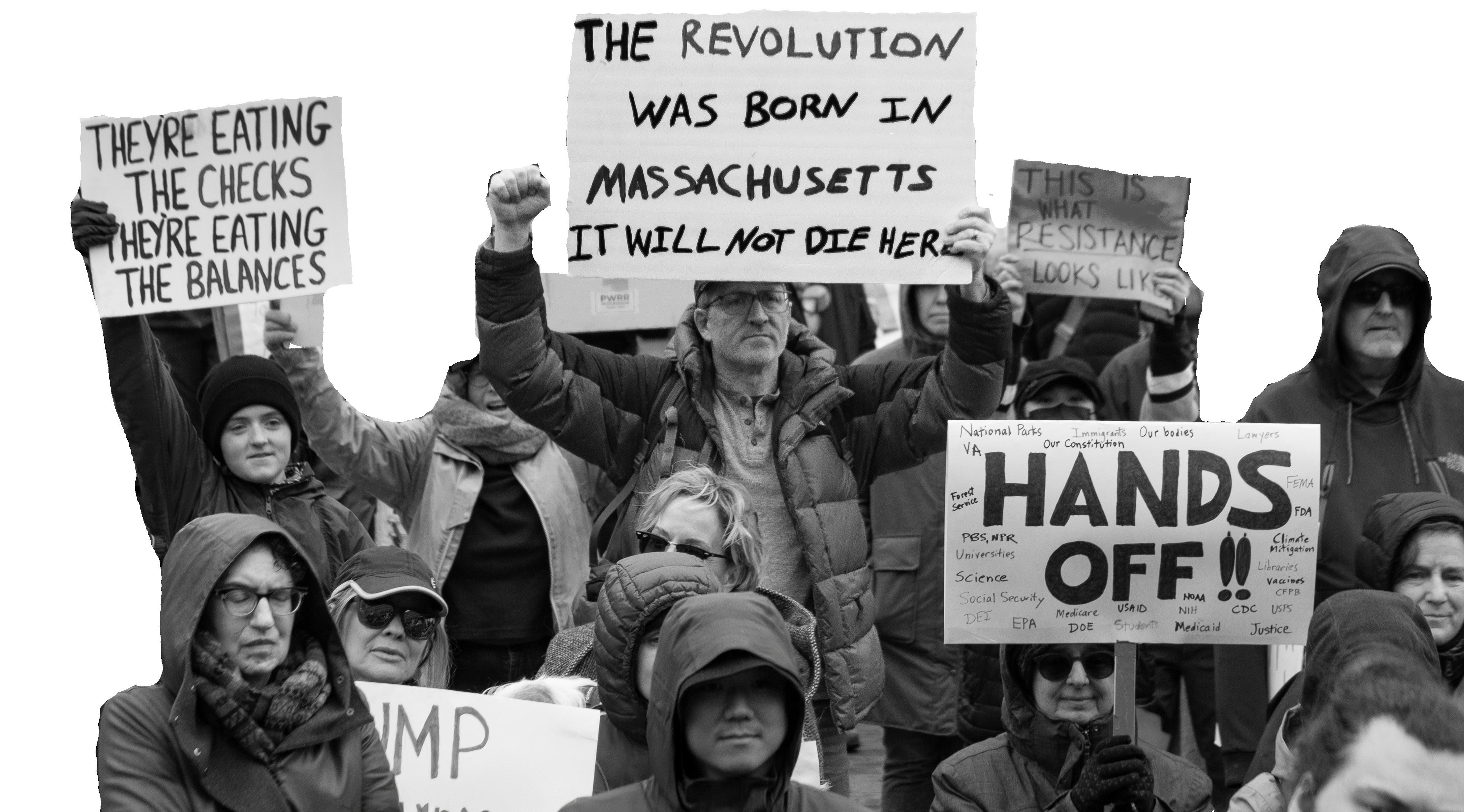
DEVYN RUDNICK News Staff
Every day at 10 a.m., Clarrissa Cropper or her husband, Leonard Egerton, open the doors to Frugal Bookstore — a family business in the heart of Roxbury and Boston’s only Black-owned bookstore. In 2024, Frugal Bookstore was named one of the city of Boston’s “Legacy Businesses” and has been vital to the community since it opened in 2008. The city of Boston names a cohort of “Legacy Businesses” each year. These businesses are defined by the city as “long-standing, independent enterprises that make a strong contribution to community character,” and Frugal Bookstore does just that.
Located near Nubian Square, the shop serves a predominantly Black and Latino community, and the book selection reflects this by primarily featuring Black authors.
“We are a staple in the community because when I was growing up and when my husband was growing up, there weren’t many bookstores that had the majority of Black and brown authors in the stores, and we weren’t reflected in a lot of the book covers,” Cropper said. “So to be able to have a space that we can share with our community, a community that we grew up in… It’s such an honor to be in this position.”
Shelves of colorful books, prominently displaying classic and up-and-
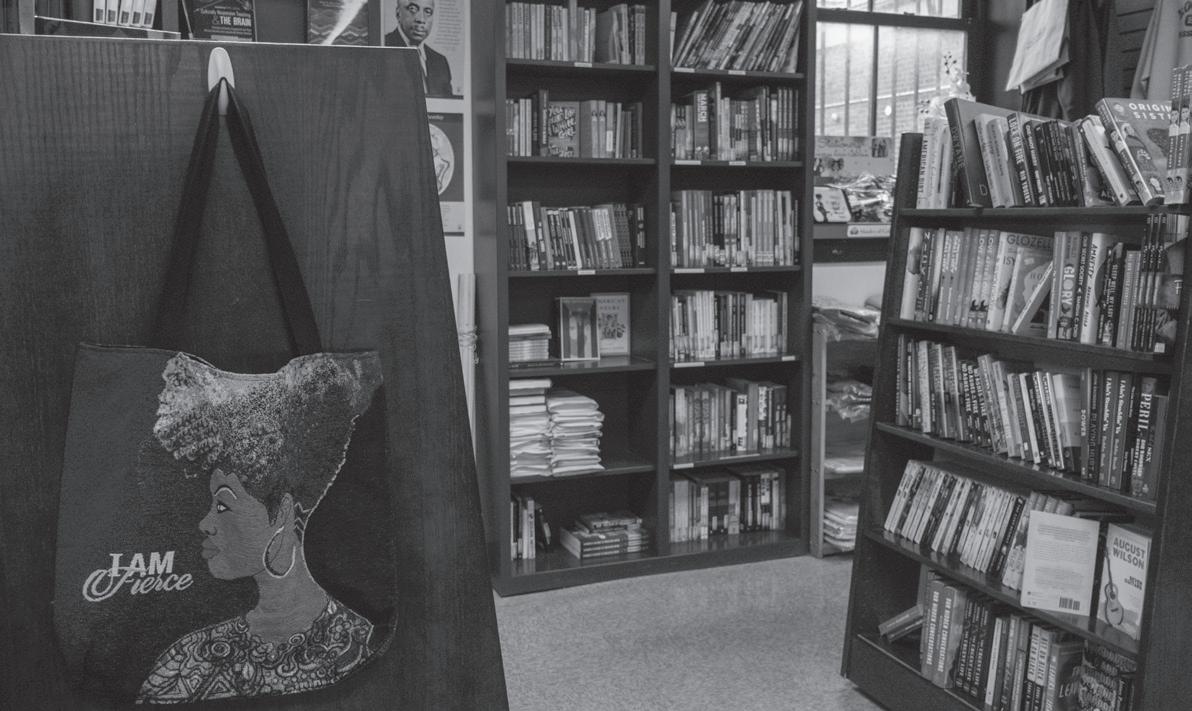
Devyn Rudnick
coming authors, line the store’s walls. Every genre has a place, from poetry to children’s books; there’s a seemingly endless array to choose from. There’s even a box filled with free books for customers to take from the store’s entrance. A consistently updated event board also alerts customers to the shop’s upcoming activities, like book club meetings and publishing launch parties.
Frugal Bookstore originated in a mini-mall plaza where Bob Romanow sold books out of his furniture store, Frugal Furniture. Romanow sold the bookstore independently to current co-owners Egerton and Cropper in 2008. The pair kept the name “Frugal,” and “17 years later — here we are,” Cropper said.
The shop moved to its current location nine years ago and has benefited the surrounding community ever since. Cropper and her family are passionate about encouraging literacy within her hometown, Roxbury, and are succeeding with their bookstore’s rising fame throughout the neighborhood.
“My favorite memory is when a young child came in and they were with their parents, and their eyes just lit up because they were like, ‘Oh my goodness, look at all of these books; look at all of these brown faces on the covers,’” Cropper said. “I hold that near and dear because I witnessed
that, and I remember their reaction … when they came in the bookstore and they were just so excited to see so many books with people that look like them.”
With the shelves proudly representing the community it reside in, Frugal Bookstore inspires literacy through weekly events, free books and a willingness to order any book customers desire.
For Frugal Bookstore’s customers, the store is the preferred option for every book purchase. Eugenia Gibbons, a long-time patron, has consistently returned to Frugal Bookstore “whenever [she] needs a book,” despite no longer living nearby.
“I’ve been coming for many years, for as long as I can remember, maybe the last 10 years,” Gibbons said. “I just love to come here whenever I need something — they’re always so friendly.”
Gibbons has purchased countless books from Frugal Bookstore, including Martin Luther King Jr.’s speeches and “Remarkable Creatures,” a novel by Tracy Chevalier.
“I always find something, something new and something that I love when I come here,” Gibbons said.
The shop’s influence extends beyond the neighborhood of Roxbury as well. As Boston’s only Blackowned bookstore, Frugal Bookstore is known throughout the city.
“We were planning a trip to Boston for a while, and this is one of the most anticipated places we’re going,” said Ophionia Moore, a customer visiting from Maryland.
Moore said her friend attended school in Boston and told her Frugal Bookstore is a must-see Blackowned business in the city.
“There’s not a ton of Black-owned businesses; I can’t speak for Boston, but just in general, so whenever you see one, you kind of have to support it to promote the longevity of a business,” Moore said.
Cropper and Egerton hope that their family will continue to inspire the next generation of readers in Roxbury.
“We’re the first generation, so we would love to pass it down and leave a legacy for our children,” Cropper said.
Representation is crucial to Frugal Bookstore’s mission of promoting literature throughout the community. To its customers, the shop is not just a bookstore — it’s a place of empowerment for many, including the family that owns it.
“I didn’t know I would be in this position, but now being in this position and owning this bookstore, it’s a passion, it’s a love, it’s like our heart,” Cropper said. “This is home; this is what we know; this is what we do, promoting literacy in our community.”
AYA AL-ZEHHAWI News Correspondent
While coffee has long been the quintessential choice for caffeine-hungry college students, matcha has become a popular staple at cafes and coffee shops in college cities, including Boston. The green tea latte supplies caffeine enjoyers with feelings of energy and refreshment that last longer and require a lesser intake than coffee.
But with the wide variety of matcha beverages offered in Boston, which shop does it best? Or, more importantly, which establishment satisfies the qualities that college students look for in their daily go-tos?
As a former barista and an avid matcha enjoyer, I rated the iced matcha lattes at four frequented cafes near Northeastern to figure out where students can find the best deal. The drinks are analyzed by convenience of location, price and overall taste with an emphasis matcha’s leafy green which indicates the of chlorophyll and antioxidants present in the powder, meaning a healthier and more flavorful latte.

student-frequented location, the Tatte Bakery & Cafe at Marino Recreation Center offered a pleasant surprise. A small iced matcha latte cost around $4.81 without sweetener and $5.35 with added vanilla syrup. At first glance, the sweetened latte had a dark, grass-colored hue that carried into a rich matcha flavor and a smooth taste. In contrast, the unsweetened matcha latte was less saturated in color with unmixed powder lingering in the cup.
For matcha enjoyers who prefer a more bitter taste, Tatte offers a delightful latte that has deep flavor and intense color.

Tatte Bakery & Cafe — Taste: 7/10, Price: 9/10, Location: 10/10
Perhaps the most
Tatte’s iced matcha latte is a strong contender, offering a full-bodied pick-me-up at a justifiable price and convenient location.

Pavement Coffeehouse — Taste: 5/10, Price: 5/10, Location: 8/10
A quick five-minute walk from campus, the Pavement Coffeehouse Symphony location served an overly sweet iced matcha latte. Made with a presweetened powder mix, which dilutes the matcha’s authentic flavor, the latte had a lighter green color and less intense taste. If you prefer a more flavorful matcha, this is a disappointing purchase considering its price of $6.25 for a regular 16-ounce drink and $7.25 with added vanilla syrup.
The premixed sugar and syrup in both lattes overpowered the overall flavor of the drink, but it remains a good option for those who might complain about matcha’s grassy taste and prefer a sweeter beverage.
Blank Street Coffee – Taste: 7/10, Price: 9/10, Location: 6/10
Blank Street Coffee on Boylston Street, the most recently established cafe out of the four, serves a bright green iced matcha latte with no sweetener for just $5.26. While patrons can add their choice of honey, raw sugar or stevia, the beverage on its own is not overwhelmed by the matcha concentrate and serves as a good foundation for signature Blank Street flavors such as blueberry, white chocolate and the new seasonal strawberry shortcake matcha latte.

Matcha Cafe Maiko – Taste: 9/10, Price: 4/10, Location: 7/10
Matcha Cafe Maiko, just a six-minute walk from Northeastern, stands out as the only spot on this list dedicated solely to matcha — and for good reason. Its lattes boast the best taste and quality around campus. With a vivid light green color and a deep matcha flavor, the iced matcha latte at Cafe Maiko is a rejuvenating beverage for all types of matcha enthusiasts.
easily customizable flavors.
If you prefer a more personalized drink, try making matcha at home! With a myriad resources across social media and online, it might be cheaper, tastier and more rewarding in the long run.
Making matcha is both an art and a science; while understanding the importance of temperature, whisking mechanics and highgrade powder is instrumental for a well-crafted drink, everyone has their own taste and ingredient preferences. Nonetheless, it’s worth giving these places a try and seeing what ranks first on your list.
This matcha latte felt the most refreshing and thoroughly mixed. However, the iced matcha at Blank Street might be a tough sell to those who prefer sweetened drinks, as the flavor in the original can be leafy and bitter. Across multiple visits, though, Blank Street tended to be consistent in flavor and a good choice for students who frequent the central branch of the Boston Public Library across the street.
The regular iced matcha is thoughtfully presweetened, creating a delightful complement to the slight bitterness of the matcha powder. However, for all of its advantages in taste and convenience, this cafe rates low in terms of price, coming in at $6.96 for its medium iced matcha latte. Compared to other establishments, Cafe Maiko had the most authentic matcha flavor, color and aroma, though its nearly-$7 price point remains unjustified.
For the average matcha enjoyer, Tatte is the strongest contender among these bustling establishments. If you’re looking for something on the go, Blank Street serves a decently sized 16-ounce iced matcha latte at a cheaper price with

EMILY CHUNG News Staff
In my second year of college, I became addicted to hosting dinner parties.
During my first co-op in New York, I invited the only three people I knew in the city over to my apartment and cooked dinner for them. Since then, many of my fondest memories from college have been made over various dinner parties at my apartment, parks and on living room floors.
There’s something very special about a dinner party. It can seem daunting at first, but you have the power to transform it into whatever you want it to be. It can be fancy, casual, outlandish, somber. You can invite three people or 20 (but who has the apartment space for that?). And above all, the dinner party is a vessel for a good conversation. Small gatherings foster a strong community. With students at Northeastern rotating in and out of co-op cycles, it can be difficult to find time to maintain face-to-face friendships. Dinner parties are the perfect way to debrief and catch up with old friends or form new friendships. When you host a dinner party, you are the director. You create the environment. As a self-proclaimed dinner party connoisseur, here’s how you can make the most out of your dinner party planning:
1. Find something to celebrate
For every dinner party, you need to name the occasion. It can be big, small, random — just find something to celebrate. If your friend got their first co-op offer, celebrate it! If you finally finished that essay you were procrastinating on, celebrate it! If you hit 500 connections on LinkedIn, celebrate it! If you finished all of your midterm exams and bombed every single one of them, celebrate the fact that at least you made it through.
Earlier this year, some of my best friends spent two weeks of sleepless nights working on a project for a club. By the last day, they were running purely on adrenaline and coffee. I invited them and a few other friends over to my apartment to eat dinner and celebrate their accomplishment. I baked a matcha strawberry cake and wrote “Yay! It’s over!” in buttercream on top of it. College is tough. Find every excuse to celebrate anything and everything.
2. Create a soundtrack
Half the fun of a dinner party is the before: picking a menu, buying ingredients and dancing around your kitchen while youwait for the pot to boil. It is of the utmost importance that you curate the perfect playlist to accompany you while embarking on this journey. This is what I like to call “the movie montage phase” of the preparatory process.
The music you choose should be entirely dependent on the type of food you’re making. For example, I



exclusively listen to the “Waitress” Original Broadway Cast Recording every time I bake something. But, I would never dare to listen to showtunes while I cook. It just doesn’t fit the atmosphere.
For a cozy night in, go with the classics: Billy Joel, Joni Mitchell or The Beatles. If you’re cooking with friends, do some karaoke: Taylor Swift, One Direction orLady Gaga. Pick something upbeat and lighthearted to set the tone for a fun night.
3. Pick a theme
If you’re planning on hosting a potluck, pick a theme for the food. Maybe everyone brings their favorite comfort food or a food that starts with the first letter of their first name. You could request that everyone make food from a specific cuisine. Picking a theme will help provide structure to your party and give your guests some guardrails. Otherwise, you might end up with a dinner combo of grilled cheese and sushi. If you’re making all the food for your dinner party, you could try to pick an ingredient to center all of your dishes around. At the last dinner party I hosted, I went with a Korean-Italian fusion theme: I made gochujang honey glazed chicken thighs, kimchi focaccia, tteokbokki alla vodka and a spicy sesame slaw. In the future, I want to try more fusion themes and play around with different flavor combinations. Get creative! Search
for inspiration on social media, at restaurants or try my favorite method: Grab every ingredient that looks good at the grocery store and find a way to make it work.
4. Set the table
The saying is true — “you eat with your eyes first.” I value the look of my dining table almost as much as I value the taste of my food. It’s an art. Go to Trader Joe’s and buy some flowers to make a table centerpiece. Buy a few candles from the clearance section of T.J. Maxx. Fold up some paper and in your best cursive handwriting, write out your guests’ names for place cards.
In September 2024, my friend and I co-hosted a dinner party at her house. Our theme was “The End of Summer,” and we wanted the decorations to be bright and sunny for summer and the food to be warm and cozy for fall. We made a white wine chicken pasta dish, rosemary focaccia, crostini with goat cheese and fig jam, apple cider and a mixed berry pie. She lit the candles, set the place cards and opened the windows to let the warm summer air in. We listened to “Kansas Anymore” by Role Model while we cooked.
The dinner was a reunion for our Dialogue of Civilizations, and it was the perfect environment for a long overdue life catch-up with friends and a wonderful start to the semester.

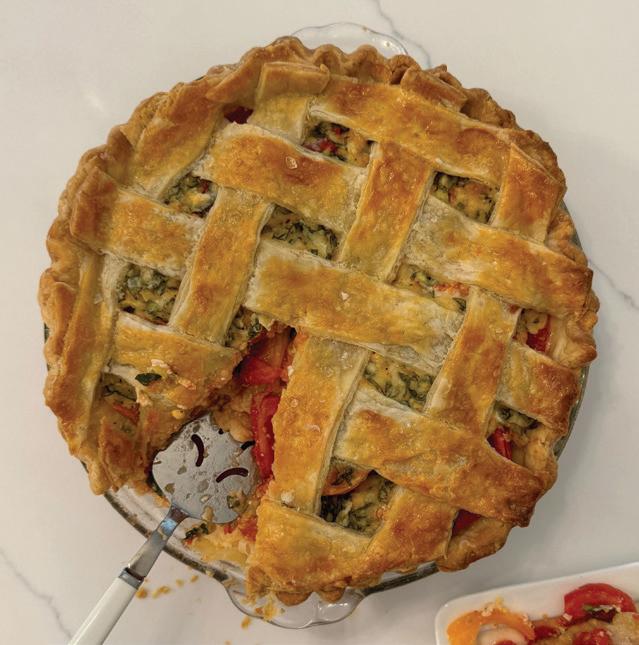
5. Make a fun dessert
I am a huge proponent of mandatory dessert. Having something sweet after dinner is the law, as far as I’m concerned. Dessert is also your moment for a grand finale. Bake something fun that goes along with your theme! Recently, I’ve loved baking cakes, not only because I think they’re the most dramatic form of dessert, but I also have the opportunity to write something fun on the top. If not a cake, I will usually bake some sort of cookie or bar because they’re the most transportable dessert. If you have leftovers, you can send your friends home with Ziploc bags full of cookies like little party favors. Something I learned from my mom: Always make a giant batch of cookie dough and scoop and freeze half of it. That way, if you are ever in dire need of a cookie, you always have some on hand (I have actually had many cookie emergencies in my lifetime. You would be surprised.)
6. Go into a food coma
At the end of your dinner party, you should be ready to take a huge nap. My greatest wish for every dinner party is for the conversation to be so enthralling that I lose track of time, for the food to be so delicious that I eat too much of it and that I laugh so hard my stomach hurts. By the end of the night, I hope we are already setting a date for next time, and I hope that all of my guests leave happy, full and smiling. This is what college is about.

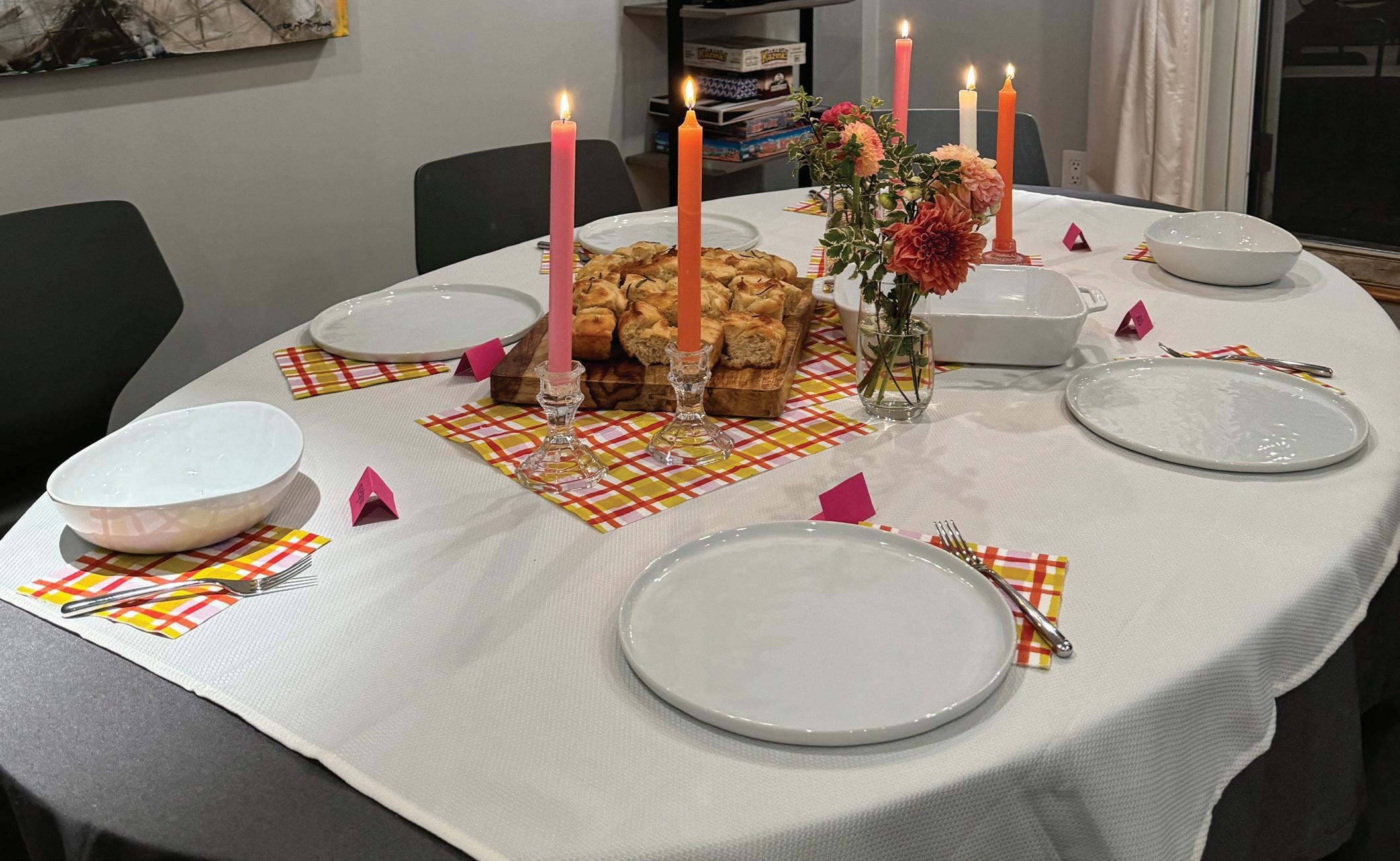
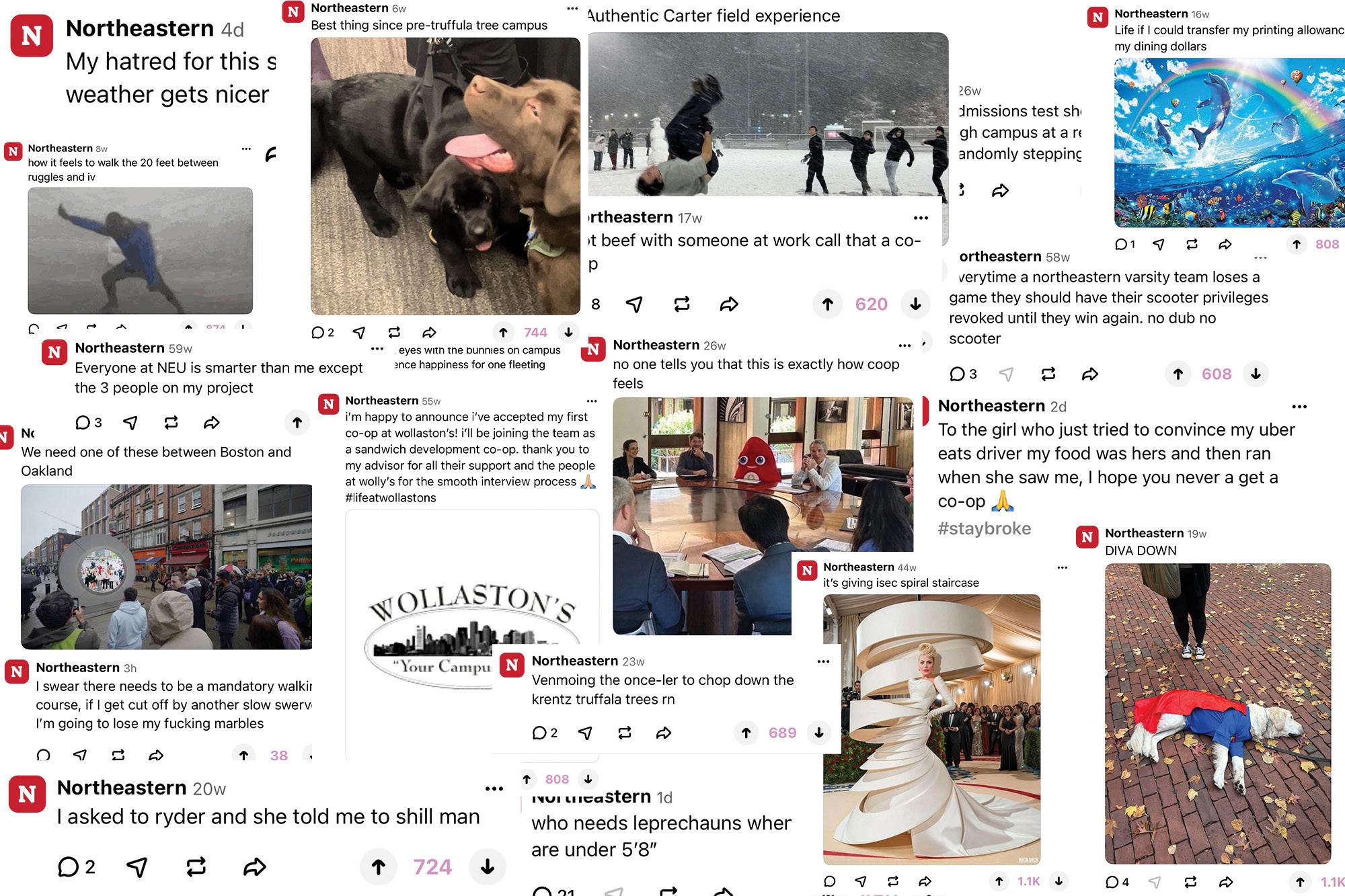
Slow walkers. Greek life. The International Village wind tunnel. Finals week. Campus dogs. Why are all the frat men short? Is anyone else sick right now? Why are people barefoot in Snell Library?
All these topics and more flood the endless stream of posts on Sidechat.
Sidechat, a social media app launched in 2022, connects college students through discussion forums specific to their university, where students can post anonymously. The app’s layout resembles Reddit and mirrors an older college-based, anonymous platform, Yik Yak, which Sidechat acquired in 2023. When signing up, users input their student email address to gain access to their university group.
At the top of the app, users can sort their feed by “Hot,” which displays posts that are currently trending, “New,” which displays the most recent posts first or “Top,” which displays the most upvoted posts.
Users can collect “karma” from upvotes, reply to posts in discussion threads and private message users.
On Northeastern Sidechat, posts range from memes about campus life and complaints about Boston weather to requests for advice.
Maddy Krempler, a fourth-year business administration major, checks Sidechat a few times a week as a source of entertainment.
“People say crazy, random things that happen around campus or just around Boston, and it never really fails to make me laugh,” Krempler said. “I love going on there and just seeing how many people upvote crazy things that are being posted.”
Sprinkled among the jokes and complaints are some posts that give a glimpse into a more wholesome, positive student experience.
And, of course, many pictures of the campus dogs.
Sidechat does not filter any posts based on language, but takes posts down if they are reported by other users and deemed to be in violation of Sidechat community guidelines. Behind the shield of anonymity, users have posted rankings of sororities and judged the attractiveness of the girls in them.
Some universities, like the University of North Carolina, are working to ban the app from their campuses for cyberbullying concerns. At Columbia University, the app was used to rally students to join encampments calling for a ceasefire in Gaza, but came under fire by administrators for racist rhetoric.
One topic that frequently seeps into Northeastern’s Sidechat is Greek life. Fall 2024 recruitment saw a record number of students rushing sororities, and for those few weeks, Sidechat was a place of constant discussion about the different chapters. While many of the posts were harmless, the anonymous nature of the app allows for hateful comments to be posted without recourse.
“I know there’s a lot of talk about Greek life and talking down about certain fraternities or sororities on campus, too, which can definitely harm the image of that fraternity or sorority,” said Bradley Lyon, a second-year architecture major.
Lyon, a member of the Phi Delta Theta fraternity, noticed some of the posts made about the fraternity but said they hardly bother him.
“Most of it has been pretty jokingly,” Lyon said. “Some people do it on purpose to gain some traction or something, and I think we’re not alone in that either. … We mostly joke about it — like we don’t really take it that seriously.”
Lyon views Sidechat mainly as a place of lighthearted discussion but is also wary of the self-consciousness it can inflict for some students. He has seen posts with pictures of people around campus and thinks the app could potentially impact the way people conduct themselves in a public setting in the event that it gets posted online.
“I would say that it has some impact [on campus culture],” said Joseph Rossillo, a third-year mechanical engineering major. “As to what degree, I’m not really sure. … I think that it is helpful, maybe, with also kind of opening the conversation about certain aspects of college and maybe making it more casual.”
For Northeastern students who are particularly passionate about Sidechat, the online forum enters real-world conversations.
“It comes up in real life all the time,” Krempler said. “I will be sitting in my living room cracking up to myself, and my roommates are like, ‘What are you — what is going on?’ And then I obviously scroll through and show them everything because they’re not on Sidechat, but I’ve been trying to convince them to join.”
Despite some of the negativity on the app, Krempler believes that the app fosters a sense of community within Northeastern’s student body.
“I think that it brings people together,” Krempler said. “It’s a place where people can be real with each other and relate.”
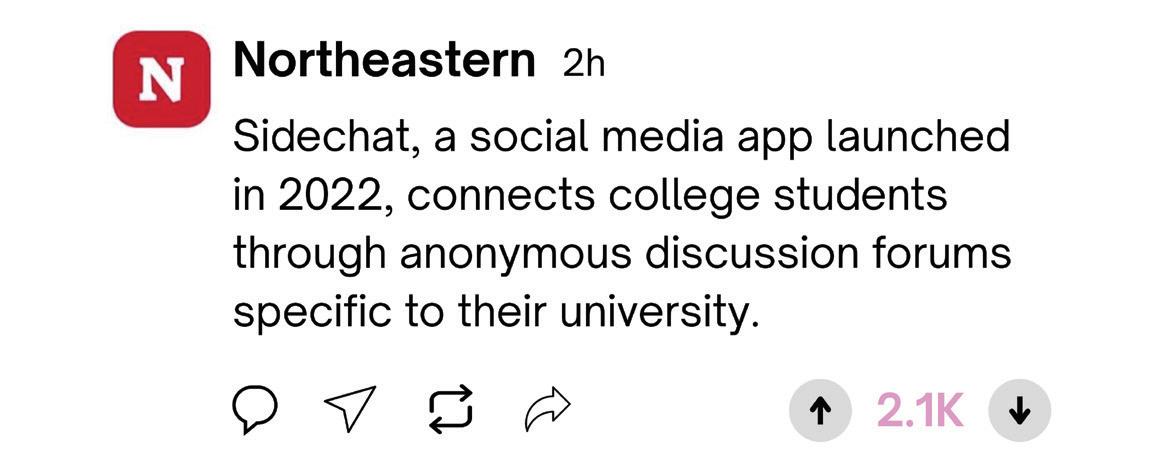

SUNDAY, APRIL 13
Trip to the New England Botanical Garden
2 p.m. at Matthews Arena
Admission: Free with Husky Card
MONDAY, APRIL 14
Pop-up Game and Comedy Lounge
6 p.m. in Curry Student Center
Admission: Free
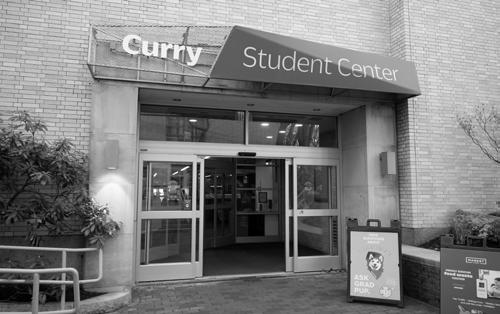
TUESDAY, APRIL 15
SARC Take Back the Night Event
5:30 p.m. on Centennial
Common
Admission: Free
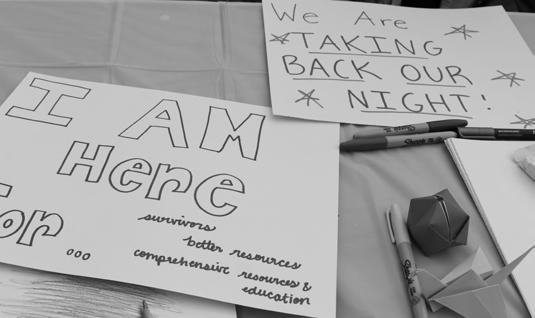
WEDNESDAY, APRIL 16
Men’s baseball vs. Kansas State
2 p.m. at Parsons Field
Admission: Free

THURSDAY, APRIL 17
NU Stage Production of “Anastasia”
7:30 p.m. at Blackman Auditorium
Admission: Free ticket
FRIDAY, APRIL 18
Red Sox vs. White Sox — Grateful Dead Night
7:10 p.m. at Fenway Park
Admission: $-$$$ ticket

SATURDAY, APRIL 19
NUDANCO Spring Showcase
8 p.m. at Blackman Auditorium
Admission: Free ticket
SUNDAY, APRIL 20
4/20 Weekend at Rooted In
10 a.m. — all day at 331 Newbury
St.
Also available April 17, 18 and 19
Admission: Free registration online
CASSANDRA JOYCE News Staff
Traditions at Matthews Arena are everywhere in the historic, 115-yearold building. Since 1910, the arena has seen legendary teams pass through its doors, including numerous Beanpot champions, the Boston Celtics and the Boston Bruins. In March, the structure marked the end of its final season as the home of Northeastern hockey and men’s basketball before it is torn down and replaced by a new multi-purpose facility.
One of the most notable and amicable traditions for the otherwise rowdy DogHouse — the Northeastern student fan section — during Northeastern hockey games at Matthews is the call and response between the DogHouse and the announcer during games.
At the end of each period, when the announcer says there is one minute remaining, the DogHouse cheerfully shouts “Thank you” and is answered with a “You’re welcome.”
“I think it’s funny and unique,” said Grace Thompson, a third-year biochemistry major and dedicated member of the DogHouse.

“It’s a cool way to interact with the actual game in a way that’s not just the players.”
Although the roots of the tradition are unknown, it has been a staple part of attending Northeastern games for years.
To Matthews Arena announcer
Jefferson Mills, the tradition helps him feel more a part of the game and have a connection with the fans.
“I wish I could interact more with the fans,” Mills said. “I love it because every time I say ‘You’re welcome,’ I actually look at the student section and see the different students [doing] a celebration or they’ll point at me.”
Northeastern’s tradition has gone on to inspire other schools. While working games at Bentley University, Mills saw the chants continue there.
“It’s so funny because when Bentley came to Northeastern years ago, they heard all the [Northeastern] students do that, so Bentley does that now,” Mills said.
For DogHouse leader and thirdyear data science and economics major Misha Ankudovych, the tradition helps get people interested in the game.
“I never went to a hockey game [until] I went to the first home hockey game my freshman year, and I can count on one hand how many games I’ve missed since then,” Ankudovych said. “My first game, I didn’t know what was going on, [but] I was screaming. It helps people who aren’t sports fans or hockey fans get it. Even if you don’t care about the sport or get
it, it can be fun anyway.”
Although this is the last season with games taking place in historic Matthews Arena before the university relocates its teams as it constructs the new multi-purpose athletic facility, there is no doubt that the call and response and other iconic traditions at Northeastern hockey games will carry over into the new arena.
“Things will definitely change, [but] they [always] have over time,” Ankudovych said. “It’s all an information transfer. I still talk to people who led the DogHouse five to 10 years ago, and they give you advice and insight into what they did during their time. As long as we’re able to keep that up, we can keep those communications.”
Whether or not students are fans of hockey, the DogHouse provides a sense of belonging and a way for students to immerse themselves in the Northeastern community.
“Hockey is a good time. If nothing else, give it a chance,” Ankudovych said. “There is a community and fun to be had. I met some of my best friends through the DogHouse, and hockey is an entry point into a larger community where the traditions come from. Be loud and that’s all you need to do.”
Beyond the pom-poms and backflips at the sidelines of basketball games, the Northeastern cheer team takes on adversity as a club sport while supporting the Northeastern and Boston communities through philanthropy.
The club team, which placed third nationally in its division last year, showcases intensity and rigorous commitment in its training as they practice at the Cabot Center three times per week, usually between 9 p.m. and midnight.
Northeastern’s cheerleaders have a history of success despite the hurdles the team has faced. In 2002, the team won first place at the National Cheerleaders Association Collegiate National Championship and performed at the 1996 Olympic opening ceremony.
Despite its status as a club sport, Northeastern’s cheer team competes against D1 varsity cheer squads. The designation comes with several hurdles for the team.
“Women’s sports in general don’t get a lot of respect,” said Emma Jordan, co-captain and fourth-year American Sign Language and human services major. “I don’t think many students at Northeastern know that we have a cheer team and that we’re ranked so high.”
In the past, the team’s practice time slot has been taken due to D1 teams claiming the space on many occasions, according to several cheerleaders who spoke with The Huntington News.
broadcasting, said that though the university’s athletics and recreation staff tries to minimize changing or canceling booking facility and room reservations, “sometimes circumstances necessitate scheduling adjustments.”
“All bookings for club sports in the Cabot Center are booked with a contingency that they could be moved at any time,” Houde wrote in an email to The News. “Varsity teams are given priority to
practice times, as are visiting teams due to conference rules … When a booking change is necessary, the club sports staff are notified as quickly as possible.”
But with 64 club sports, 17 D1 teams and a limited amount of practice space, cheerleaders say they feel their sport often falls to the bottom of the priority list.
“We try and provide an equal amount of time and space for our club sports student-athletes as well as intramural and recreation student-athletes. But the challenges are real, and it is facility challenges,” said Jim Madigan, Northeastern’s athletic director, in an interview with The News.
club. Club sports teams at Northeastern, regardless of if they are high-contact, do not have automatic access to athletic facilities or trainers.
“Athletic trainers are provided for select club sports home competitions, based on risk factor, by a third-party service. That coverage is in place for the duration of the competition only,” Houde said. “Ongoing treatment is managed through
University Health and Counseling Services, as it would for the general student population.”
The National Institutes of Health reported in 2022 that “cheerleading is associated with the highest number of direct catastrophic injuries.” If one member gets hurt, the team’s entire routine has to change.
around $50,000 per team.
Pagano, who works full-time as an oncology nurse at the Boston Medical Center, spends her nights coaching and advocating for the team.
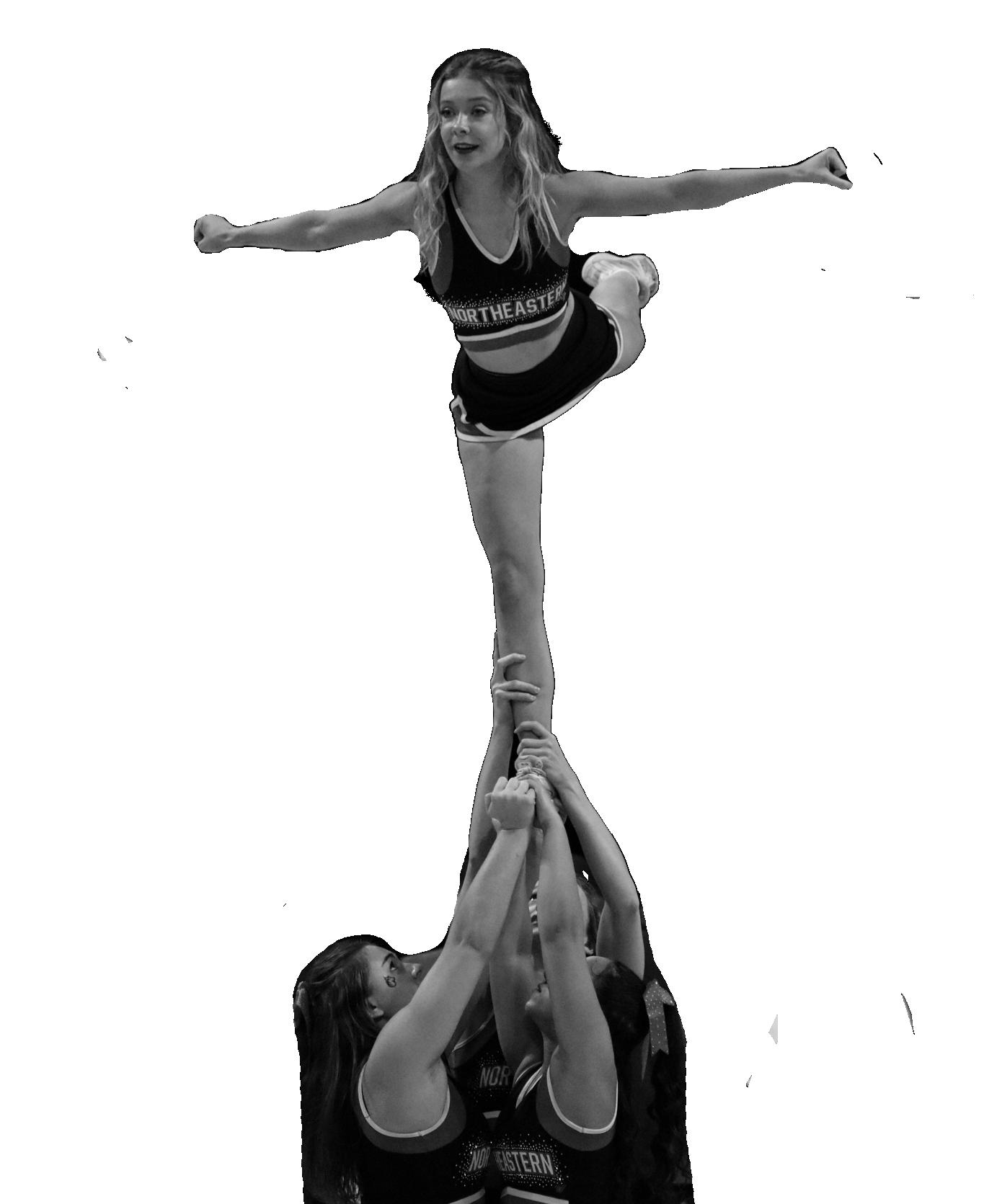
Matthew Houde, Northeastern’s associate athletic director of communications, public relations and
Practice space is not the only issue the team faces due to its classification as a
“When we lose one athlete, we lose four,” said team captain and fourth-year psychology major Jenna Barber. Moreover, cheerleaders say funding from the university tends to fall short. This school year, the team was allocated $300 per athlete for up to 20 members, according to head coach Kennedy Pagano. But the cost of competing at College Nationals in Daytona Beach, Fla., averages
“If I didn’t love the girls, and didn’t feel like I built the program up, I don’t know if I would still be here,” said Pagano, who has been coaching the team since 2021. “The financial compensation does not pay off, but the mental reward does.”
According to an annual survey by the Northeastern’s athletic department in 2024, the average salary for the head coach of a women’s D1 team was $141,541. According to the club sports handbook, club team coaches make significantly less — Pagano earns $5,000 per year for 16 to 20 hours per week as her maxed out salary.
Pagano uses her salary to buy senior gifts for the graduating team members, get the team food at events, as well as chip in when more money is needed to go to Daytona.
“My goal is to get a national championship and then advocate for more,” Pagano said.
The team is also involved in many local community service events, participating in the Jimmy Fund Walk, MDS events, colon cancer walks, Blue Sky Day and volunteering at the Perkins School For The Blind.
From community outreach to advocating for more wide-spread recognition, the Northeastern Cheerleading team hopes to highlight its broader contributions to the school.
“We do so much more than just the basketball games,” said Jordan. “I think that would be something that I want the general student body to know … We’re more than just decorations on the sidelines.”
Northeastern’s club fencing team won the title of No.1 in the nation for its third year in a row at the United States Association of Collegiate Fencing Clubs, or USACFC, National Championships April 6.
The fencing team was founded five years ago as a club called NU Blades by 2023 Northeastern graduates Michael Vala and Clara Wu. The team became an official club sport a year later and is currently under the leadership of fourth-year health science major and president Laura Chu and fourth-year business administration major and student coach Ben Kelly.
“We put a lot of work in, we train, we condition, we do everything that is necessary to put ourselves in position to win,” Kelly said.
The team practices three times a week in Marino Recreation Center, and many players train on their own time at fencing clubs in the Boston area.
Northeastern club fencing competes in épée, saber and foil fencing, each of which have different blades and rules. Épée uses the entire body as a target with point attacks, foil focuses on the torso with point attacks and saber uses the entire blade above the waist for attacks with both the point and the side of the blade.
This spring, Northeastern club fencing kicked off its season with a
strong performance at the Boston University Fencing Invitational, with victories in men’s saber, women’s and men’s épée and a total of 10 medalists across the board.
At the New England Intercollegiate Fencing Conference, or NEIFC, Championships in late February, the team continued to dominate against their collegiate competition in the area. NEIFC hosts club and varsity teams, so winners are named both overall and among the club-level teams.
The Huskies won first place in the six-weapon club team for the fourth consecutive year, which encompasses all three weapons for both men and women. They came second for overall six-weapon team behind the Massachusetts Institute of Technology, an NCAA Division III team.
tionals after NEIFC, it was optimistic about its future success.
“Coming out of NEIFC, we’re all feeling a certain confidence going into it,” said Ashley Maestrado, the team’s treasurer and a second-year behavioral neuroscience major, before the team went to nationals. “We have a title to uphold.”
Maestrado started fencing at 8 years old, and has been fencing competitively for years. Many
importance of team dynamics in an individual sport.
“Winning is wonderful and fun and great, but it’s really the people on the team and how we support one another,” Chu said. “We work as a team and we’re always there for each other.”
Kelly agreed. “Our culture and our hard work has really put us at the forefront of club fencing.”
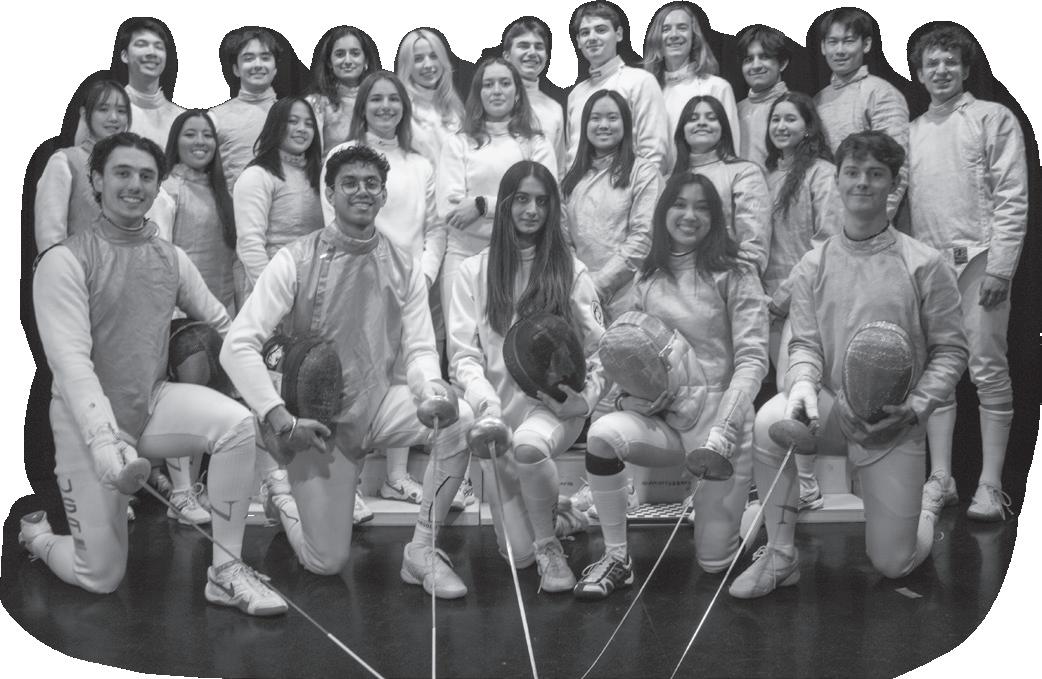
Northeastern also took first place in the women’s three-weapon club team for the third year in a row, as well as first place in the men’s three-weapon club team. Finally, the team took second in women’s saber and third in women’s overall three-weapon team, which both included NCAA Varsity competition.
As the team looked ahead to na-
Edited by Arielle Rabinovich
teammates also came into the club with experience, but the team still offers opportunities for less experienced players to get involved. It has found success by focusing on both fencing development and community. Kelly and Chu emphasized the


Despite its impressive accolades and status as the No. 1 club team nationwide, Northeastern has not yet implemented a varsity fencing team.
“We reached out to USA Fencing because they were looking to develop more Division 1 teams, and they were very happy that we reached out,” Kelly said. “They worked with us to try and get something done with Northeastern, but unfortunately, Northeastern is not going to prioritize fencing.”
“Northeastern said a big no, they were not too kind about it,” Kelly added.
Matthew Houde, Northeastern’s associate athletic director of communications, public relations and broadcasting, said in a statement to The Huntington News that the university considers a myriad of factors when evaluating club sports’ propositions to be considered varsity.
ACROSS
1. “Lay All Your Love On Me” quartet
5. The Great __, spanning much of Nevada
10. June 2024 album inspiring a summer aesthetic
14. Type of bottom feeder
15. Land of the free, informally
16. __ Ora, British singer songwriter
17. Awake, perhaps (2 wds.)
18. Bank fixtures
19. Oil-producing group
20. Loathe
22. Actress Thompson of “Creed”
24. Chair
25. Technological tool created by Anthropic now available to Northeastern students (2 wds.)
29. Freestyles, maybe
32. Login credential (2 wds.)
33. Seats found around a pub
38. Sleeping noise
39. “Sweet Talkin’ Woman” band, for short
40. To pry
42. Drug-busting U.S. agency for short
43. Sidekick to Batman
46. Type of dress, perhaps
49. Art installation that will soon be removed from Krentzman Quad
51. Like a baobab or coconut
52. Ultimately (2 wds.)
55. Protective plastic sheet
58. Shakespearean lover
59. Helmet apt for a Reddit user
61. Many a baby’s first word
64. Entertain
66. Gone, slang
67. Give off, like light
68. Catch a show (2 wds.)
69. John __
70. Miller __
71. TV program centered on celebrity gossip
72. Uno + Dos
“Our goal in Athletics and Recreation is to provide a quality experience for all our varsity, club and intramural student-athletes,” Houde said. “When we receive appeals from club programs looking to transition to varsity, we take several factors into account when making a decision including facility space, roster size, coaching staff requirements, support staff requirements, conference opportunities, Title IX requirements, financial obligations and more. In addition, as the national landscape of collegiate athletics continues to shift and evolve, we must be strategic and flexible in order to put Northeastern Athletics in the strongest possible position to succeed at the highest level.”
Nearby schools with Division I fencing programs include Boston College, Sacred Heart University, Brown University, Harvard University and Yale University. Division III schools in the region include Brandeis University, Tufts University and Vassar College. Northeastern beat Vassar, Sacred Heart and Brandeis to take second overall at NEIFC this year.
The fencing team plans to focus on defending its national title and continuing to recruit top fencers with hopes of leveling up in funding and recognition.
“We compete where we can, we do the best we can and we’re happy to go out there and be the best club team,” Kelly said.
DOWN
1. Corrosive liquid
2. Counterparts to 1 Down
3. Ruffian
4. Seems
5. Police raid, informally
6. Cool _ _ cucumber (2 wds.)
7. Something bounce has, phonetically (2 wds.)
8. Start to a sentence expressing one’s emotions (2 wds.)
9. Capital of the Bahamas
10. Widen, as one’s horizons
11. To crack, like a joke
12. Cleared your plate, say
13. Tic-__
21. ASAP, in a hospital
23. Figure out, informally
26. Eat away at 27. Buenos __
28. Plans, notions
30. Transaction processing system often used by waiters, for short
31. Not daughters
33. Yogi __, legendary baseball player
34. Reserved
35. Mechanical assistant, perhaps
36. Parking area
37. To organize
41. Course standard
44. Repetition, for emphasis
45. Roman Emperor
47. __ Davidson, famous comedian
48. Perform as the start (2 wds.)
50. To mar
53. Unreliable car, maybe 54. Head pest
56. Oarsman
57. Susceptible to 59. They’re sometimes hidden
60. “Woe is me”
61. __ Brooks, EGOT winner
62. Pal, in Marseille
63. Cambridge University
65. Stitch, say

Editor-in-Chief
Sonel Cutler
Managing Editors
Ananya Kulkarni Val O’Neill
Editor-at-Large
Armanini
Campus
Algazy
Sports Elli Einset Frances Klemm
Lifestyle
Darin Zullo
Christina McCabe
Claudie Bellanger
Opinion
Rachana Madhav Kara Orsini
Projects Alexa Coultoff Emily Spatz
Photo
Xing Elizabeth Scholl
Margot Murphy
Design Catherine Gore
Mulcahy
Audiovisual Jake Guldin
Data
Social Media
Annika Sunkara Kevin Gallagher
Copy Chief Laura Emde
Web Manager
Arielle Rabinovich
BUSINESS
Business Manager Eli Curwin
Advertising Manager Emily Liu
Outreach Coordinator Anna Morrison
STAFF WRITERS
Aiden Barker, Antaine Anhalt, Aoife Jeffries, Auden Oakes, Ava Vitiello, Bailey Reynolds, Bowen Rivera, Caroline Baker Dimock, Carson Lyle, Cassandra Joyce, Chloe Craft, Devyn Rudnick, Eleanor Hardy, Eli Curwin, Elsa O’Donnell, Emily Chung, Emily Rodriguez, Grace Cargill, Janira Skrbkova, Jennie Koh, Jenny Tran, Katarina Schmeiszer, Laila Guzman Griffin, Madison Evangelist, Meagan Ellis, Meghan Hirsch, Mikayla Tsai, Nidhi Prakash, Olufolake Okunsanya, Paloma Welch, Samantha Denecour, Sarah Pyrce, Siera Qosaj, Valentina Swan, Yashavi Upasani, Zach Cohen
COPY EDITORS
Aaniya Mahajan, Anne Wang, Antaine Anhalt, Anya Hill, Aya Al-Zehhawi, Hana Dada, Holly Zbierksi, Jenny Tran, Kristina DaPonte, Sarah Mesdjian, Zach Wilson
DESIGN STAFF
Jessica Xing, Morgan Conway, Natasha Sun, Bianca Windemuth, Laila Guzman Griffin, Mayah Hamaoui PHOTO STAFF
Asher Ben-Dashan, Aya Al-Zehhawi, Brian Daniels, Chloe Craft, Darin Zullo, David Martínez-Dimnet, Devyn Rudnick, Hana Dada, Molly McAlevey, Nia Calais, Sophie Quisenberry, Tanvi Saxena
SOCIAL MEDIA STAFF
Daniel Patchen, Emily Chung, Grace Cargill, Kristina DaPonte, Liam Saven
BUSINESS STAFF
Annelise Dramm, Claire Knutsen, Isaac Pedersen, Maggie Nahas, Nikolas Lyras, Sencha Kreyerman
Opinions expressed in The Huntington News through letters to the editor, cartoons and columns are not necessarily those of The News staff or the Board of Directors. Northeastern University students conduct all operations involved in the production of this publication.
For inquiries about the Board of Directors, email outreach@huntnewsnu.com. For general inquiries, email managing@huntnewsnu.com.
The Huntington News 360 Huntington Ave. 102 Lake Hall Boston, MA 02115 huntnewsnu.com




The Editorial Board is composed of The News’ opinion columnists and opinion editors and authors pieces independently of The News’ newsroom. Members of the Editorial Board are not involved in reporting news relevant to their editorials. Its views will not be influenced by The News’ editors and senior staff, which lead the paper.
The Editorial Board meets weekly during the academic year to discuss issues on campus and other topics that affect or are relevant to the Northeastern community. Editorials will be the product of discussions and questions raised during these regular meetings, and pieces the Editorial Board publishes will represent a unanimous
consensus among members of the Editorial Board.
Any student who becomes an opinion columnist may join the Board, and if you’re interested in joining The News, you can email managing@huntnewsnu.com.
It is our hope that the Editorial Board’s stances will reflect a diverse array of student viewpoints on various issues — viewpoints united behind a collective dedication to The News. At a time when peoples’ very ability to express themselves is under threat, we will work to ensure that everyone in our community can have their voice heard.
Sincerely,

Sonel Cutler | Editor-in-Chief
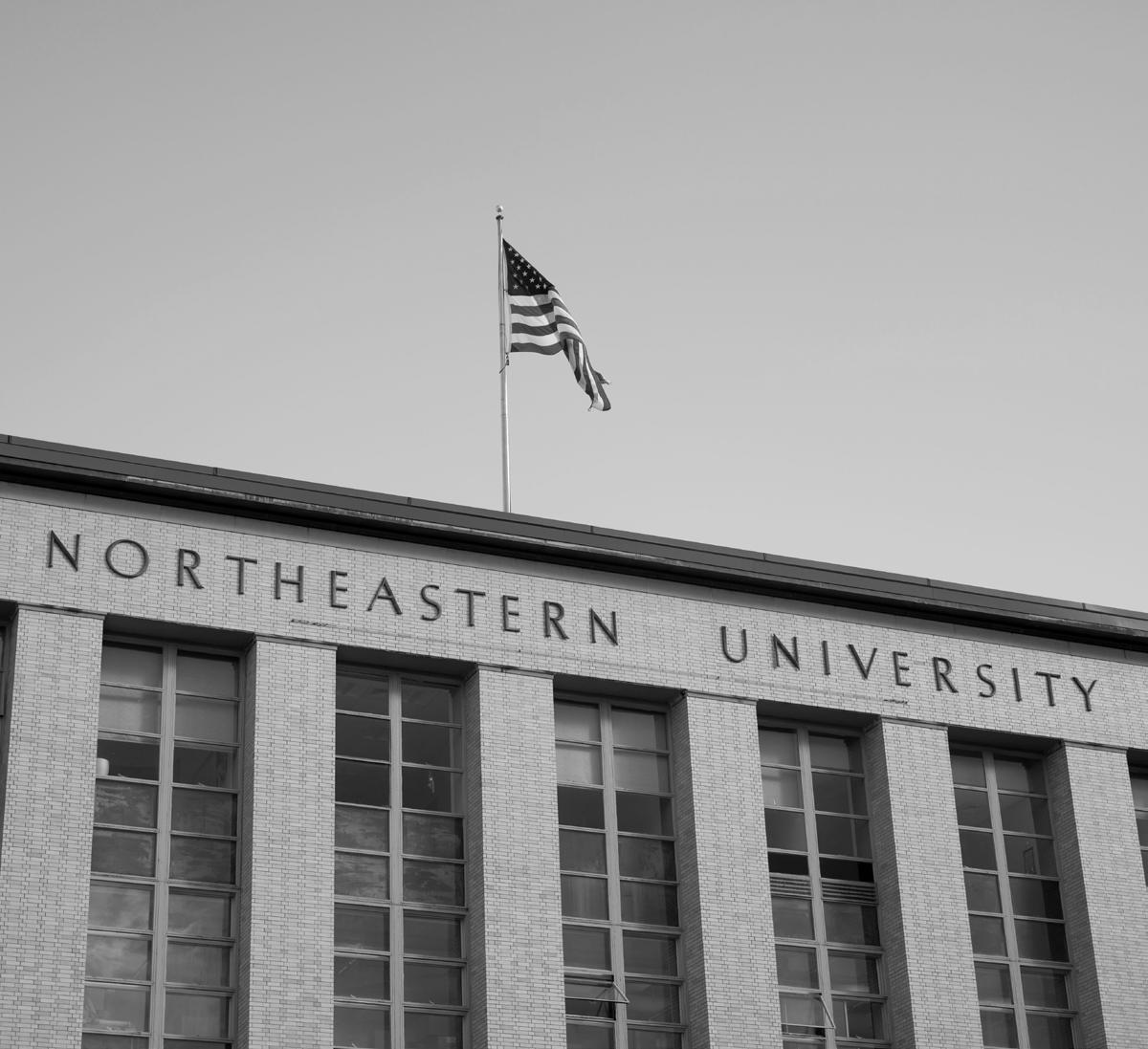
The president of the United States fired the opening shot against our freedom of expression with a sweeping declaration: Students engaged in “anti-American activity” will be “apprehended and deported.”
When the president personally determines what types of speech or actions are deemed permissible, rather than following what is established law, there is reason to be alarmed.
Branding disagreeable speech as subversive marks a disturbing return to the 1950s McCarthy era — an era defined by fear and rife with ideological persecution. University campuses are, once again, a battleground in the fight over freedom of expression and the limits of political dissent.
As an organization that can only fulfill its mission because of the freedoms of the press, The Huntington News Editorial Board condemns any action that conflicts with the First Amendment.
While the Trump administration has yet to single out Northeastern University as it has Columbia University, Georgetown University or the University of Pennsylvania, we believe it is only a matter of time before our institution is targeted by the administration. The moment will come when the views expressed by one of our professors are denounced as “dangerous” or when the president brands the actions of a protesting student as “illicit,” making no legal effort to justify such an accusation.
In the words of Northeastern President Joseph E. Aoun, the university’s mission “does not change with the times.” Neither does a student’s fundamental right to freedom of speech and freedom of expression. Northeastern’s mission is only as strong as our commitment to defending it. If we waver, hesitate or stall in standing up for our values, then Northeastern’s mission was never as ironclad as our administration would have us believe. Our university must not preemptively submit to an atmosphere of fear.
@HuntNewsNU
The Editorial Board writes this opinion, its first in over six years, not to push for a preferred political
agenda nor to alienate our diverse readership but because this extraordinary moment demands extraordinary action.
Our university is faced with the following choice: to resist attempts by President Donald Trump to stifle
protest and increased the risks for those who participate. Northeastern now reserves the right to revoke degrees “at its discretion.” The vague yet sweeping language grants the university broad latitude to punish students for actions the university
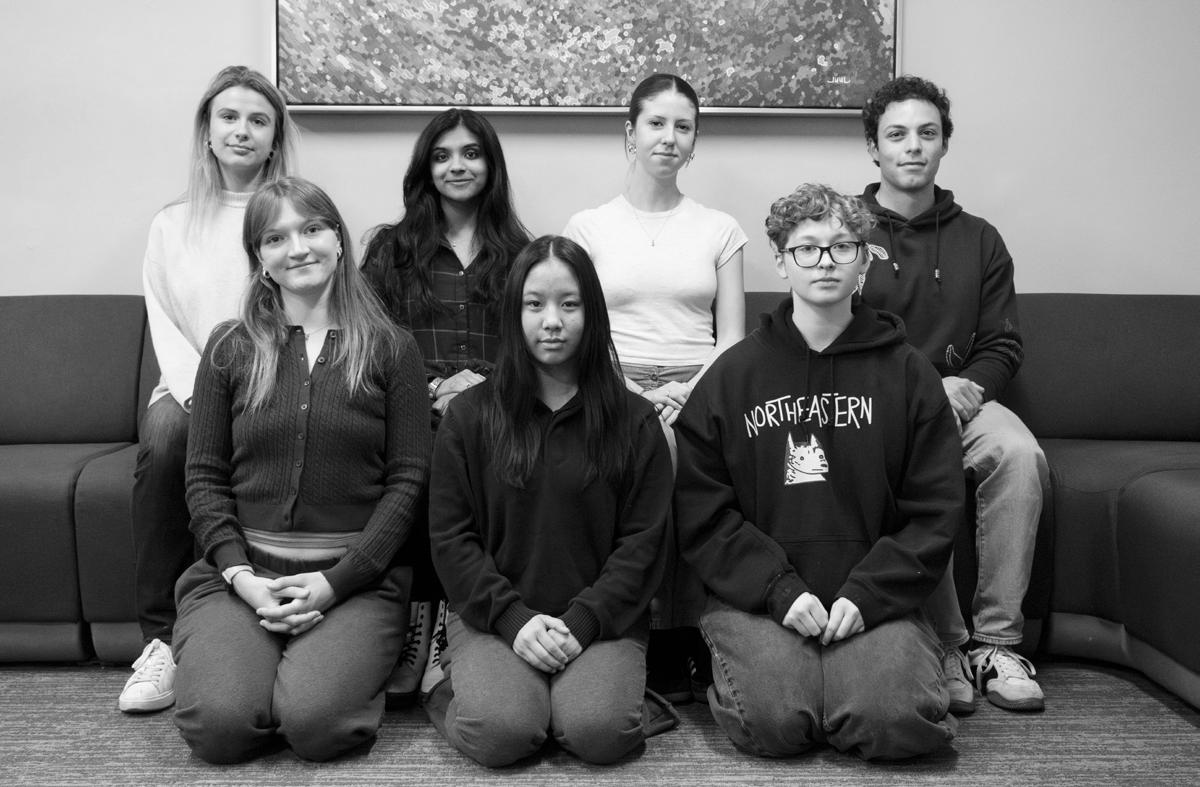
free speech on college campuses or acquiesce — forfeiting Northeastern’s founding principles, its academic independence and ultimately, its promise as an institution that champions freedom of expression.
Our administrators must not choose acquiescence.
Northeastern’s lack of clear guidance and decisive action has allowed for the Trump administration’s chilling effect on campus speech to take root. Faculty members and students are concerned about speaking out against Trump’s actions for fear of disciplinary retaliation by the university. Northeastern has a responsibility to address these concerns and ensure members of its community feel their right to free speech will be protected.
The university’s current efforts are not enough.
In the wake of Trump’s attacks, Northeastern published a frequently asked questions page to address community concerns. The university’s responses are vague, the tone is lukewarm and its answers are outdated.
Recent changes to Northeastern’s Code of Student Conduct — quietly implemented in October 2024 — have erected new barriers to student
deems personally objectionable. International students are in an especially precarious position. Many work visas, including the H-1B, hinge on having a degree. If a student’s degree is revoked, they could lose their eligibility for employer-sponsored visas and be forced to return home. For American citizens, losing a degree means a harder job search; for international students, it often means the door to permanent residency slams shut. What was once the dream of a future here — a life built on education and hard work — can be shattered in an instant, all because of a degree revocation. With this threat looming over their heads, international students will be the first to stay silent even as they are the first targeted.
Now is the time for Northeastern to revisit past changes and reaffirm that freedom of speech and freedom of thought are necessary for students’ academic excellence.
The university can begin by supporting efforts by the Faculty Senate, Northeastern’s faculty representative body, to endorse the American Association of University Professors’ standards for freedom of speech.
As a long-term defense against government attacks on academia, Northeastern is reportedly collaborating with universities across the Boston area. With an understanding that many of these discussions are of a sensitive nature, students and faculty nonetheless deserve more information as to the broad contours of these conversations. Aoun must recommit to transparency by holding monthly open meetings where students and faculty can have their countless questions answered directly.
The Huntington News Editorial Board believes that it is our duty to speak out when students’ fundamental freedoms are under assault. At the same time, we also have a responsibility to hold ourselves accountable.
We urge all readers, both those who support the stance laid out within this piece and those who do not, to make their voices heard. Send us an email. Write a letter to the editor.
As students, we’ve chosen to pursue higher education at Northeastern not only because of the opportunities the university provides but because we believe in the promise of academia.
A promise rooted in freedom of expression.
A promise that demands the tolerance of opposing viewpoints.
A promise which, if not defended vigorously, will remain just that — an empty promise.
The Editorial Board reflects the official voice of The Huntington News’ opinion section and consists of the Opinion editor, the Deputy Opinion editor and The News’ opinion columnists. Each editorial is the product of unanimous agreement by the Board. The Editorial Board operates independently from the newsroom of The Huntington News.


RACHANA MADHAV Opinion Editor
Constitutionally, there is no way
President Donald Trump can run for a third term. However, in the current turbulent, disconcerting and alarming free-fall that has been the 47th president’s run so far, we cannot say a third term is entirely out of his reach.
In a March 30 phone call with NBC News, Trump told reporters that there were “methods” for him to work around the 22nd Amendment, which states presidents can
only serve two terms. The president said he was “not joking” and “a lot of people want me to do it.”
Contrary to what he believes, a lot of people do not, in fact, want him to do this.
As of April 7, in a poll run by the Economist, over half of Americans disapprove of Trump’s presidency, with that number increasing after he levied tariffs on major trading partners across the globe.
His words, albeit laughable to some and to others a mere one-off comment, have depth to them.
Trump’s quips and bizarre statements land soundly to an attentive audience — voters and supporters who take his words as law. To them,

Trump has now etched in a real possibility that they thought of before, but coming from the president himself, now actually means something.
A third time is flatly against our Constitution. In 1796, George Washington established the precedent of a peaceful transfer of power after two terms to keep from an egregious misuse of influence from the most powerful office in the world. Presidents after him followed this unwritten rule, with some trying for a third-term but losing to their opponent. This lasted until Franklin D. Roosevelt. Finally, in 1951, Congress passed the 22nd Amendment into law, denying the possibility of a third term to any president.
In 75 years, this has not changed, and Trump should not be the one to break this barrier.
There is reason to be alarmed at his words, whether you take his statements seriously or not — there are supporters who do, and they will show up to the polls no matter what.
In 2029, Trump will be 83 years old. His supporters ridiculed former President Joe Biden’s age and deemed him unfit for presidency during his campaign, so we can only hope they hold their “king” to the same standard.
Trump informed NBC News that his plans for a third term were far off, and he was focusing on the “current” instead. Horrifically, the current is equally as bad.
His presidency thus far is in no sense of the word “normal.” There is a clear assault on our First Amendment rights; students have been pulled off the streets for making their voices heard and deported for disagreements, leaving stains of fascist ideology on the country.
There is a lack of empathy between people, an “us versus them” creed that has built up over years of political unrest, tariffs that have razed the stock market and, for some reason, there is a civilian parading around in the White House as a “special government employee.”
Our relationship with other countries has also taken a turn for the worse, with Canada being demoted to a 51st state in jest and Mexico facing increased pressure from the U.S. on topics of immigration and trade — and not to mention the embarrassing heated argument in the White House between Trump and Ukrainian President Volodymyr Zelenskyy.
Frankly, there might not be any foreign relations left standing by the time Trump’s “third term” rolls around.
If Trump were to change the Constitution and re-introduce himself as a presidential candidate in 2028, he would need two-thirds approval from the Senate and House of Representatives, as well as approval and ratification by three-fourths of the states. This is a daunting task, and it very well should be.
Even so, it is not impossible. Republicans currently hold more seats in the House as well as the Senate, with party leaders positioned to further Trump’s agenda. As the rollout of presidential orders continues in the almost three months that have passed since Trump took office, there appears to be no sign of the Republican Party slowing down.
While the Democrats were mostly met with silence from their leaders after the 2024 election, not all have given up. Sen. Bernie Sanders and House Rep. Alexandria Ocasio-Cortez have been vying to unite a lackluster party through their “Fighting The Oligarchy” tour, while Sen. Cory Booker stunned the Senate floor with his 25-hour speech March 31 opposing Trump and his actions.
In a wavering democracy, leaders and change are needed more than ever. Trump’s threat of a third term is not an empty promise, nor is it something to be brushed over. Constitutional changes cannot be at the mercy of the whims of a president, no matter how many people “want him to do it.”
Rachana Madhav is a fourth-year behavioral neuroscience major and opinion editor of The News. She can be reached at madhav.r@northeastern.edu.
We, your Northeastern professors, believe our universities are worth standing up and fighting for
KYLIE ARIEL BEMIS, RAHUL BHARGAVA, ALEXANDRA TO, RICHARD DAYNARD, RACHEL ROSENBLOOM, LAURA EDELSON
Professors, students, Bostonians — we all benefit from our universities in the realm of higher education today, but our institutions are doomed to fall unless we fight for them.
You may be healthy today because of treatment at a Boston hospital relying on research funded by the National Institutes of Health. You may love and care for the New England coastal and oceanic ecosystems, which research funded by the National Oceanic and Atmospheric Administration helps to protect. You may even rely on our National Science Foundation-funded cybersecurity research to protect your personal data without even knowing it.
As professors at Northeastern University, we are members of the same community. Faculty speak at community events, including “Meet a Scientist” at the Boston Museum of Science. We watch the same Red Sox games and drink the same iced coffee. Our students turn out by the hundreds to scream their lungs out for every runner racing from Hopkinton to Boston on Patriots Day. We are your neighbors, and you are our family.
As members of the Northeastern community, you need to know that we — and our institutions — are under attack. Federal funding cuts and freezes have halted our work on topics from generative artificial intelligence to cancer research simply because the grants contain terms
such as “women,” “socioeconomic” or “discrimination.” The dismantling of the Department of Education threatens financial aid like Pell Grants, which provide vital pathways to unlocking the American Dream for many students. The most vulnerable now live in daily terror from the Trump administration’s merciless targeting of immigrants and transgender Americans.
Beyond these immediate impacts, attacks by the Trump administration pose an existential threat to universities, communities and American democracy itself. Even top private universities struggle to produce world-changing research without federal funding. Corporate funding will not save us because it can take decades to develop the revolutionary Ozempic drug from the exploratory research on Gila monster venom.
Most university leaders have remained silent amid these attacks. Innovation relies on university research, however, industry leaders haven’t spoken up. Universities are essential to our community, however, political leaders say little.
Many university leaders nationwide believe that we can survive by complying to reduce the impact of cuts or by staying silent to avoid becoming a priority target. This blatantly ignores the immigrant and transgender students who are afraid for their safety, worrying their university will not protect them. This ignores the faculty whose research has already been made impossible merely because it mentions a now-banned phrase. It
ignores the irreparable loss of reputation when our universities sacrifice fundamentally American values like freedom of speech. We must work together to ensure this doesn’t happen here at Northeastern.
We must learn from the fate of Columbia University. We must learn that no amount of appeasement will satisfy Donald Trump’s regime. Columbia’s administration believed it could save its institution by obeying his anti-American demands, from banning face masks and shuttering departments to allowing political commissars to dictate university policy. Now, Columbia will continue to exist in name only, a mere shadow of its former self.
If we do not learn from Columbia, then the Trump administration will come for our institutions one by one, and each of our universities will fall prey to the same attack. Our leaders’ silence may temporarily delay the inevitable, but it also enables it tenfold. To borrow a phrase from the flags flown by America’s founders, now is the time for our universities to “join or die.” Together, the universities and communities of New England are one of the most powerful coalitions in the world.
Even when legal protection is beyond their capability, the words of our leaders absolutely matter; Tufts University President Sunil Kumar’s “Declaration for Rümeysa Öztürk” shows us that. Freedom of speech is one of our most fundamental civil rights in America. The powerful speech of legal residents including Öztürk, Mahmoud Khalil, Yunseo Chung and others seems to be enough for the Trump administration to violate their rights of due process in attempts to make them “disappear.” Powerful speech must then also be enough to threaten the Trump administration’s attempts to erode our democratic institutions. Therefore, we ask the Northeastern and Boston community to join us in
calling on our university, industry and political leaders to stand together. We must acknowledge the unfolding crisis, resolve to protect our most vulnerable community members and mutually pledge to fight for our country’s research, our country’s education and our foundational American freedoms.
Boston doesn’t bow to kings. Our universities are worth fighting for.
The authors of this piece are current Northeastern professors and can be reached at k.bemis@northeastern. edu, bhargava.rah@northeastern. edu, a.to@northeastern.edu, r.daynard@northeastern.edu, r.rosenbloom@northeastern.edu, l.edelson@ northeastern.edu.”
